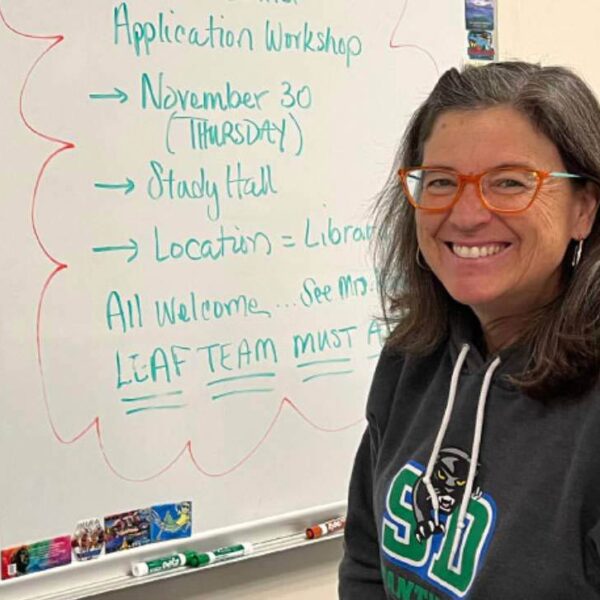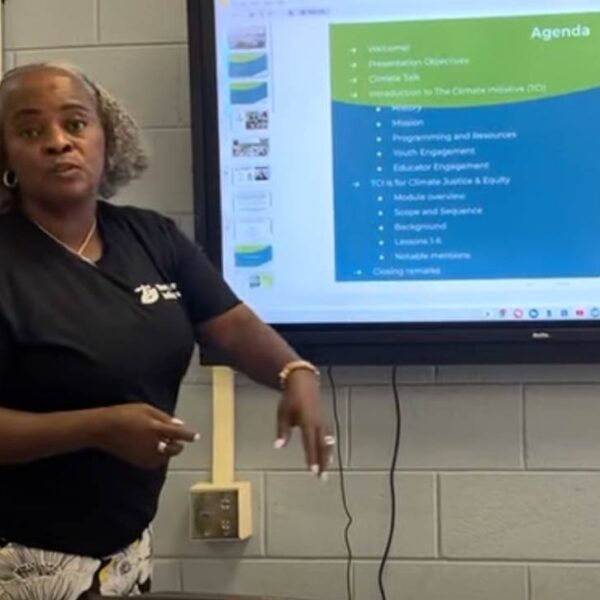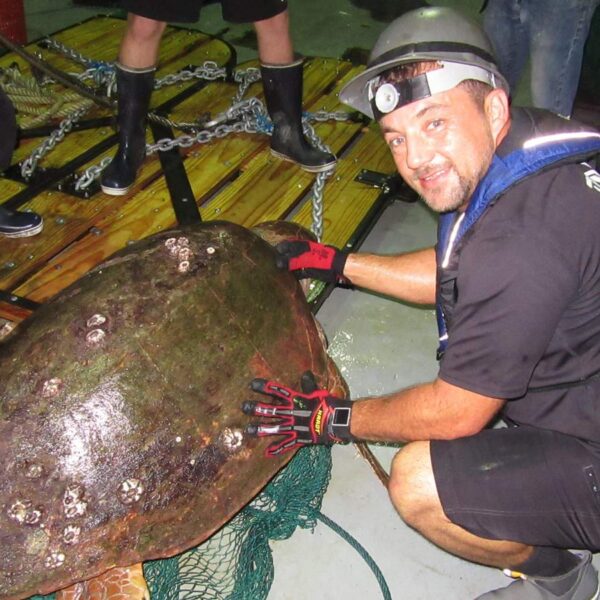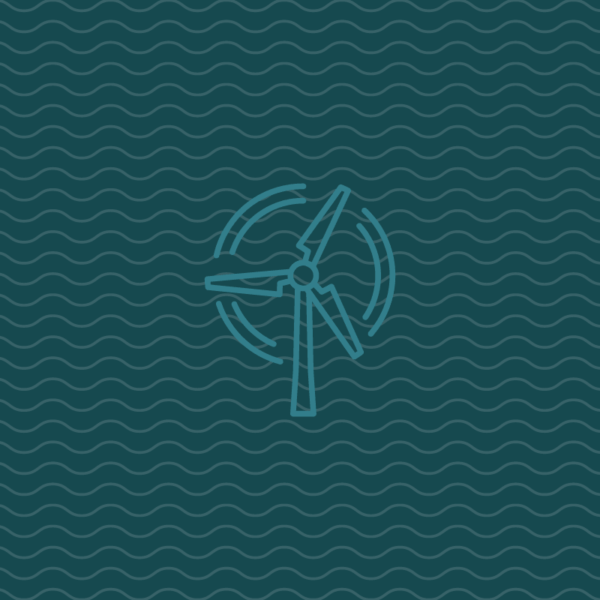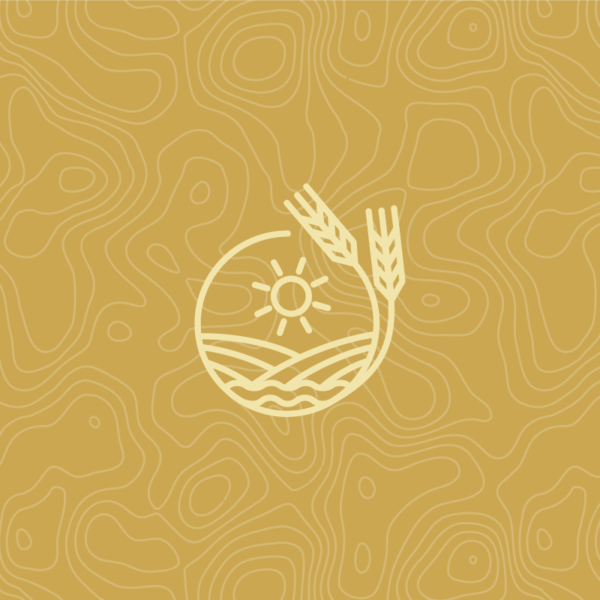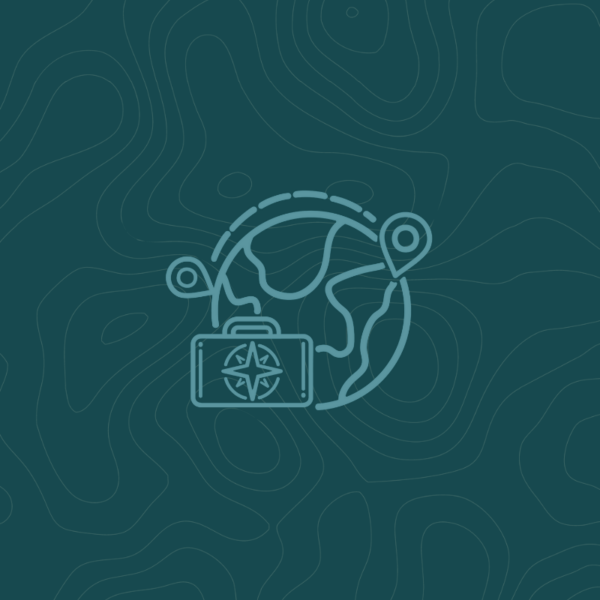Welcome to TCI’s Learning Lab Hub for Educators
Transform your classroom with free, hands-on climate education modules and expert support.
Already registered? Login
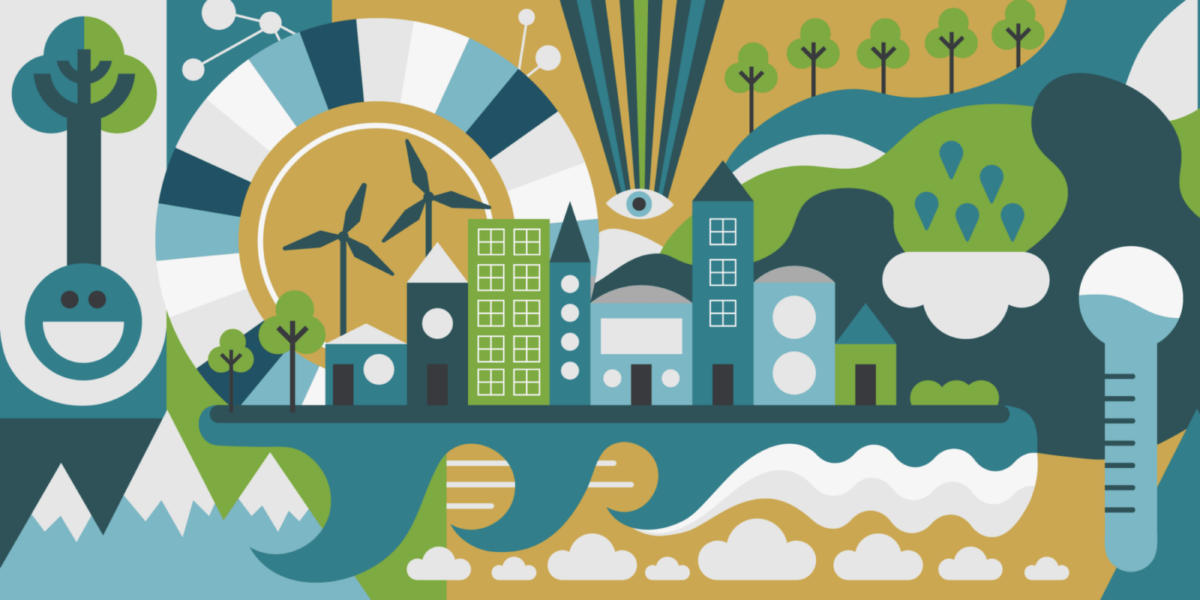
Join the thousands of educators and school districts already using Learning Lab globally.
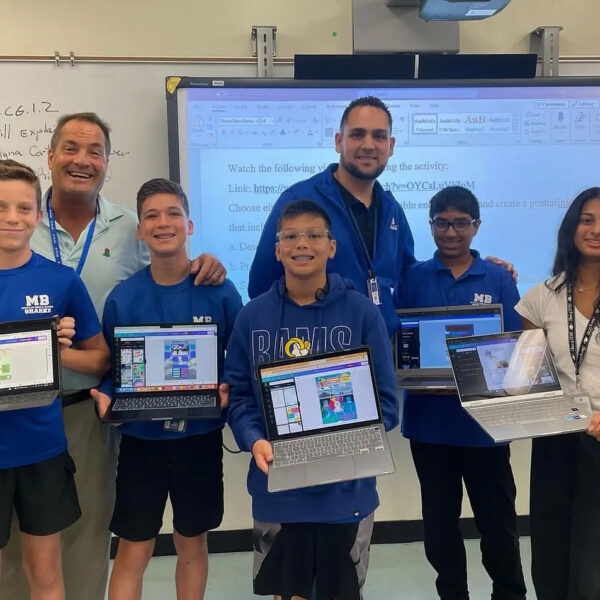
400,000+
Over 400,000 students are being taught with TCI Learning Lab
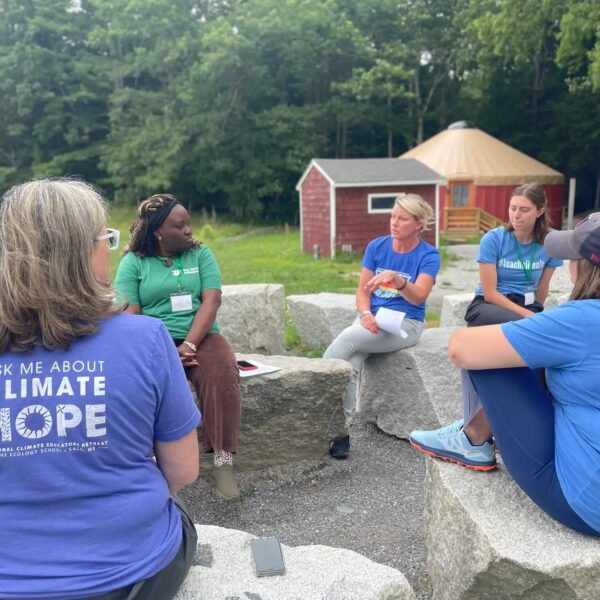
3,500+
Over 3,500 educators are utilizing Learning Lab in their classrooms

34
Learning Lab is global! Our modules are in 34 countries.

19,000+
Learning Lab students have done over 19,000 Action Projects in their communities
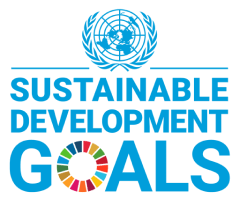
Did you know? All Learning Lab modules adhere to 21st Century Skills & NGSS and Cross Cutting Concepts as well as align with UN Sustainable Development Goals.
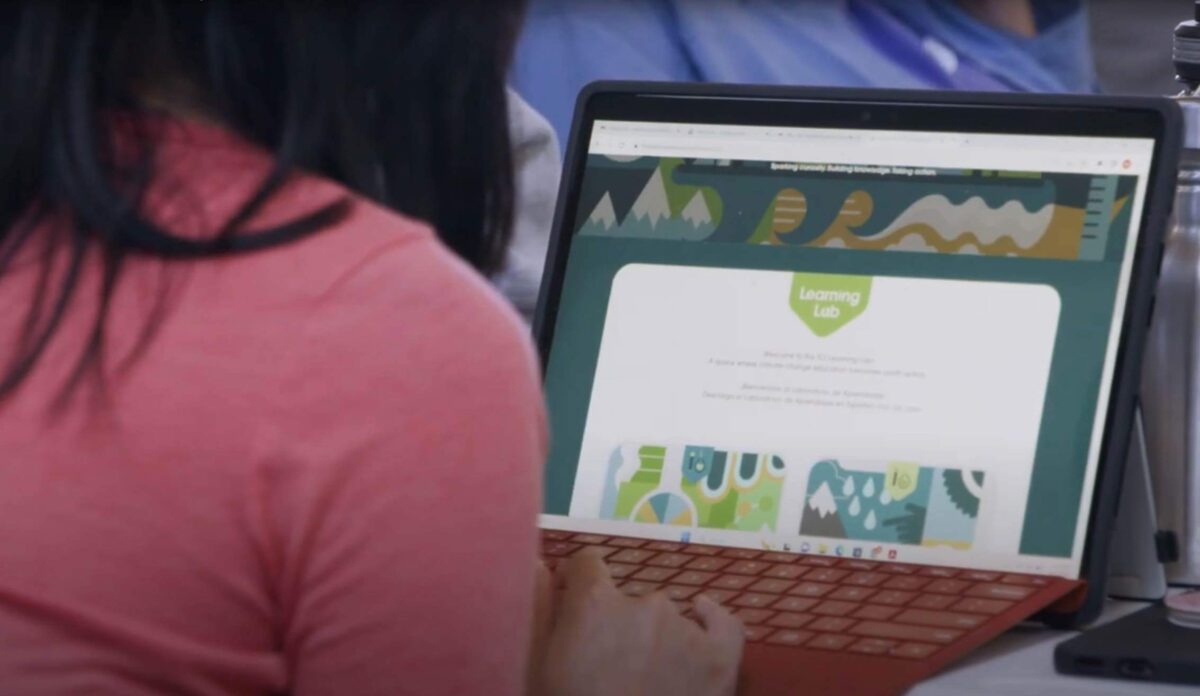
Hear from other Learning Lab educators!
Kathy Hagee
San Anselmo, CA
John Ottomanelli
Jersey City, New Jersey
Sarnya Ervin
Albemarle, North Carolina
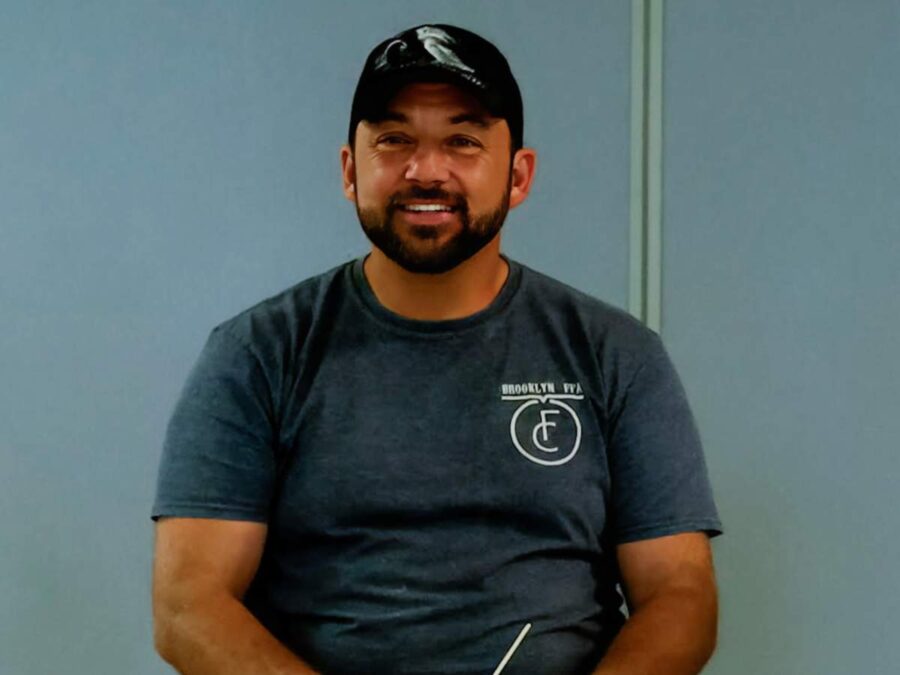
Teachers do not get paid enough, we all know that, and so does TCI. They have made it their mission to make the learning lab modules available to all teachers.
Read Matthew’s blog The Impact of Climate Education: A Teacher’s Perspective
Matthew Seal
Brooklyn, Mississippi
Learning Lab Module Topics
Scroll through and get a preview of each of our 9 (soon to be ten!) climate change modules.

Wildfires
Climate change has increased the potential for larger, more damaging wildfires. Rising temperatures create drought conditions that decrease soil moisture and increase the amount of dry vegetation and organic matter. The heat acts as a thirsty sponge, wicking up all available moisture in ecosystems from the soil, vegetation, lakes, and rivers. The drier the heat, the more water the sponge can absorb. In areas where droughts occur, trees, grasses, and shrubs dry out, fueling wildfires to spread further and faster. Combined with the stronger winds our changing climate is producing, it can push fires at speeds up to 14 miles per hour, which easily outpaces our ability to contain the fire and keep up.
In this 6-week Learning Lab module, your students will:
- Increase their understanding of Wildfires and build confidence in how to interpret scientific data
- Look at Wildfires through TCI’s three lens approach: using the economic, sociocultural, and ecological lenses to understand all points of view
- Connect climate change to their local landscape
- Elevate their voices and start necessary conversations within the community as part of a hands-on action project.
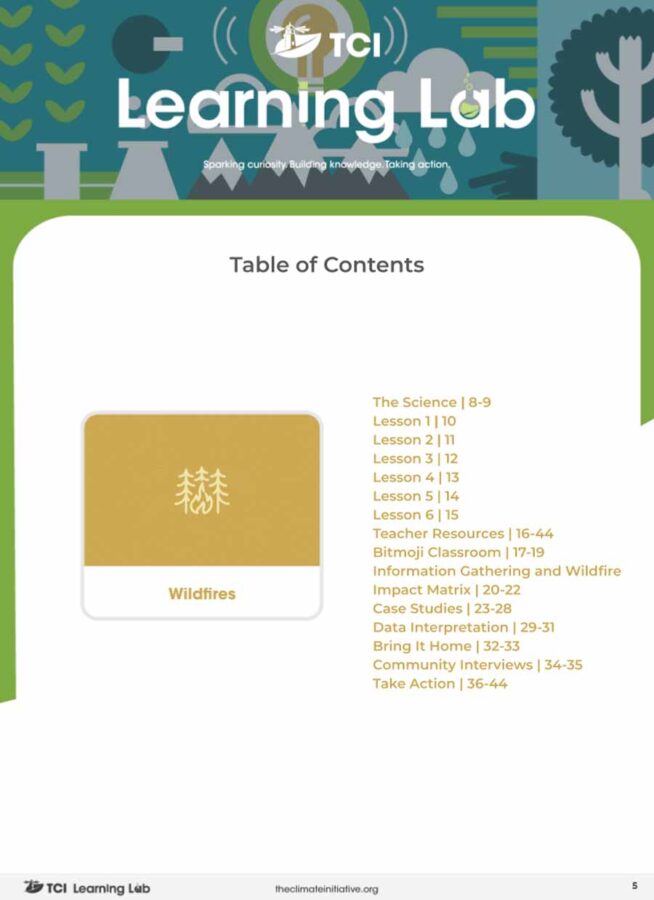
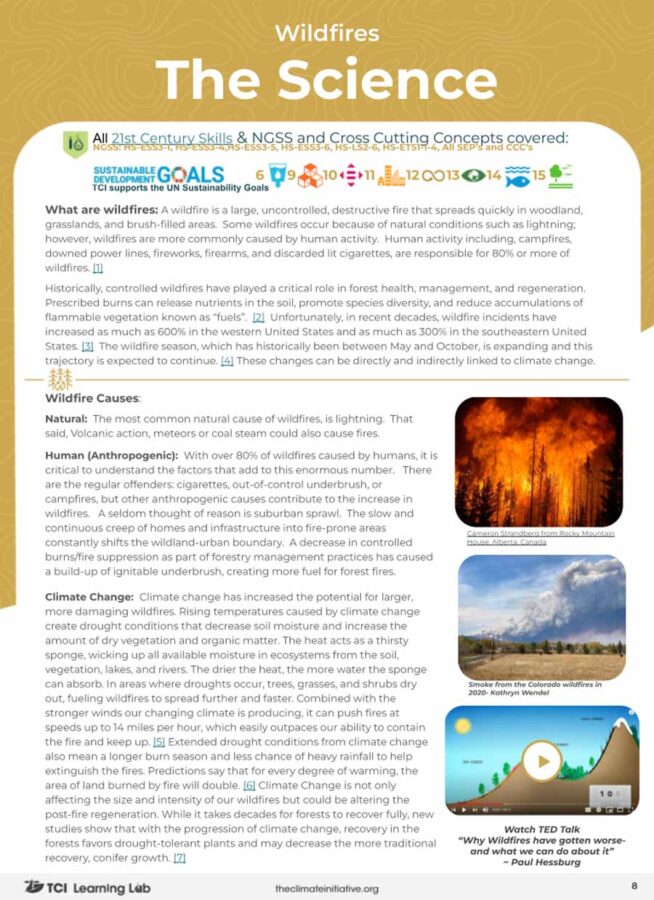
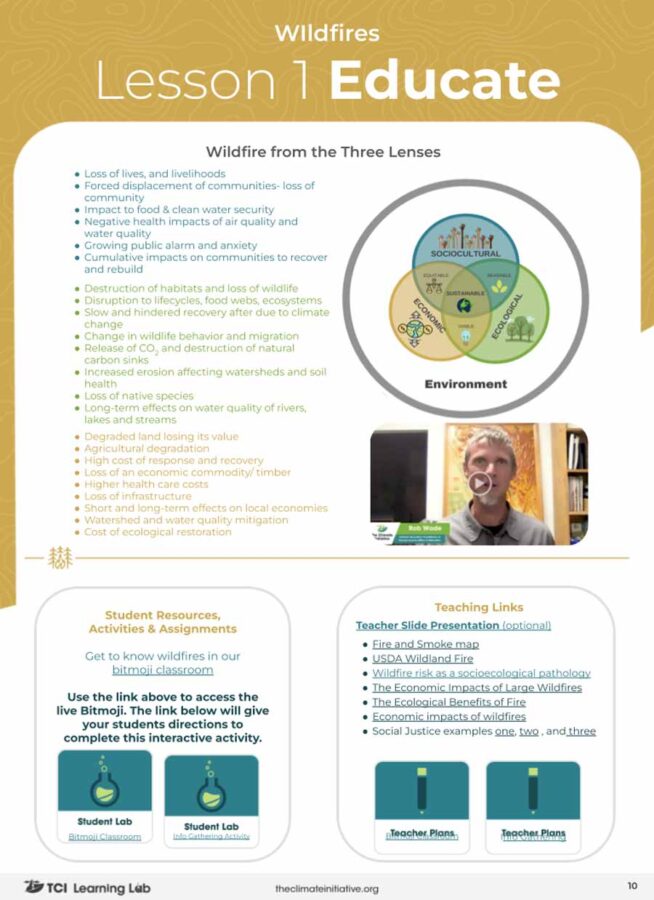
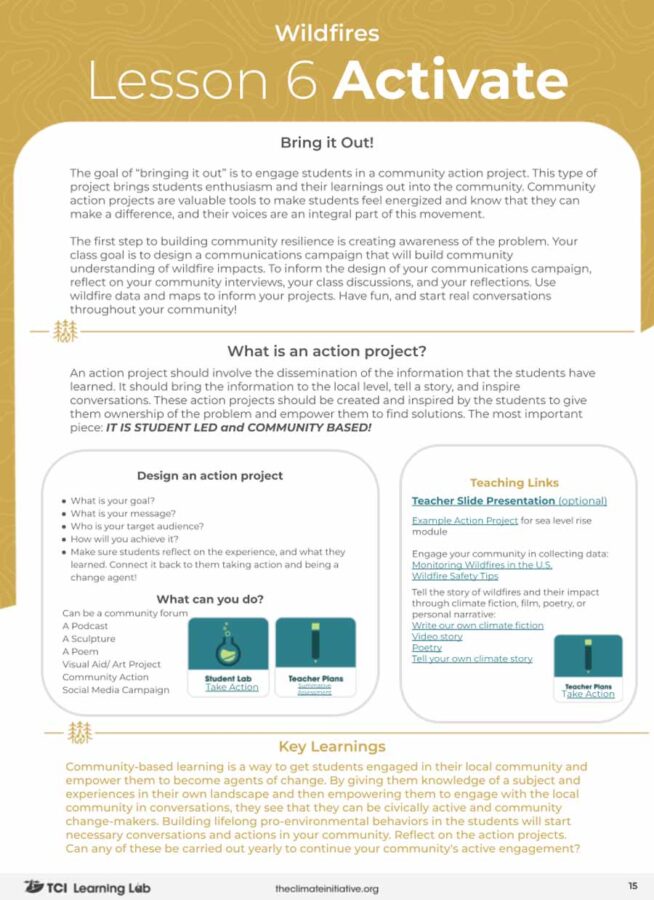

Climate Impacts & Solutions with En-ROADS
The Climate Impact & Solutions module gives educators the tools and confidence to bring interactive, engaging climate education into their classrooms. The lessons incorporate a cutting-edge, easy-to-use, climate science and policy computer model, En-ROADS. The Climate Action Simulation combines an engaging and fun role-play with the interactive En-ROADS model. Through this module, students will create local action projects for their schools and communities. They will also get to build their systems thinking skills, which will enable them to be better critical thinkers and future innovators.
In this 6-week Learning Lab module, your students will:
- Increase their understanding of Climate Impacts & Solutions and build confidence in how to interpret scientific data
- Look at Climate Solutions through TCI’s three lens approach: using the economic, sociocultural, and ecological lenses to understand all points of view
- Connect climate change to their local landscape
- Elevate their voices and start necessary conversations within the community as part of a hands-on action project.
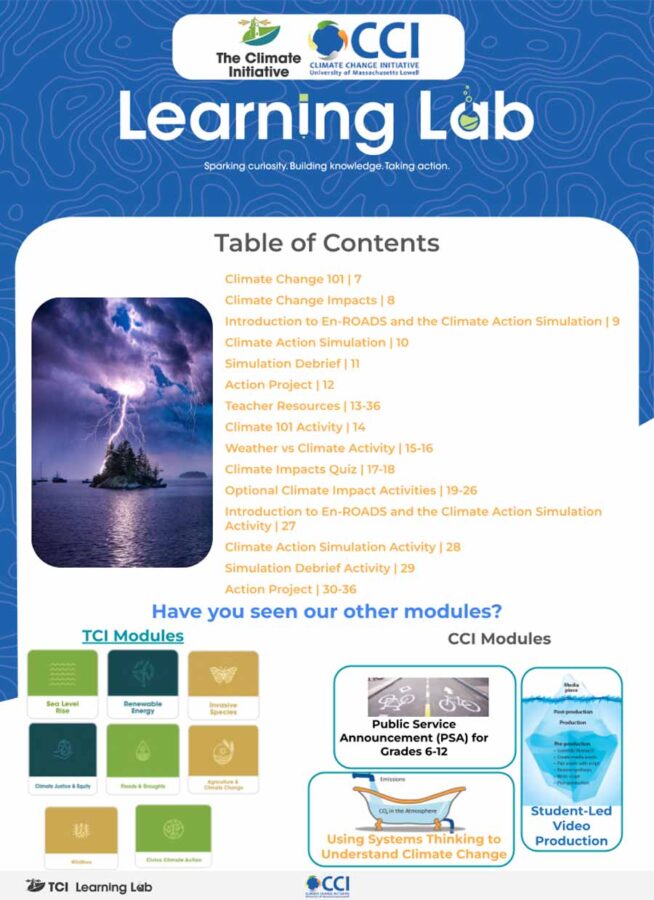
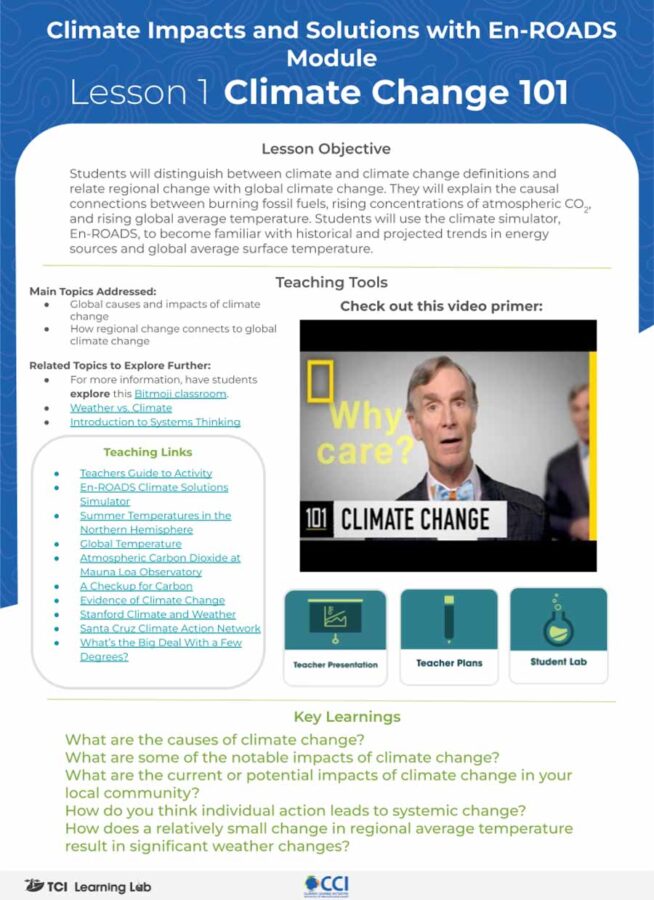
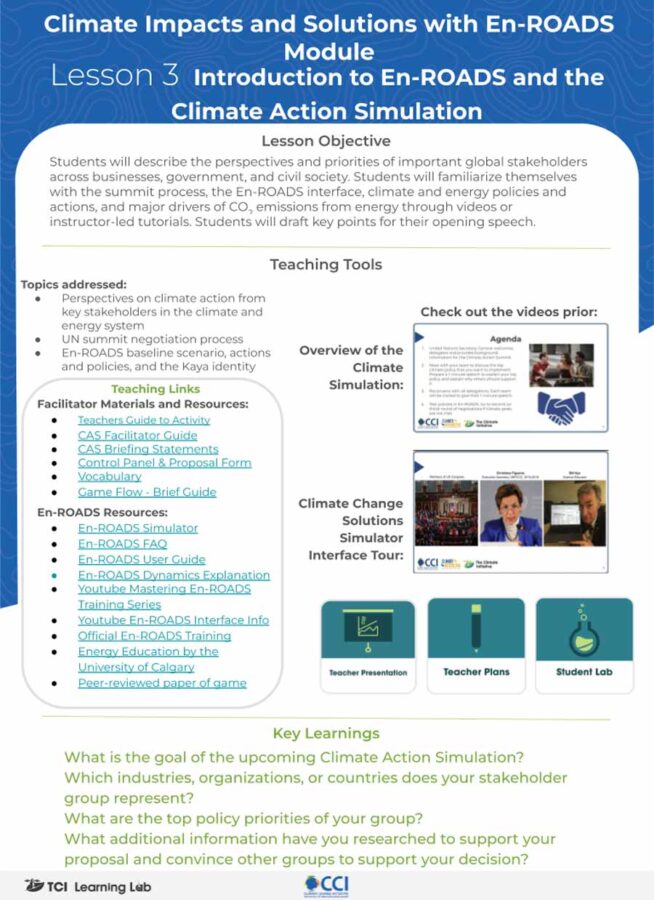
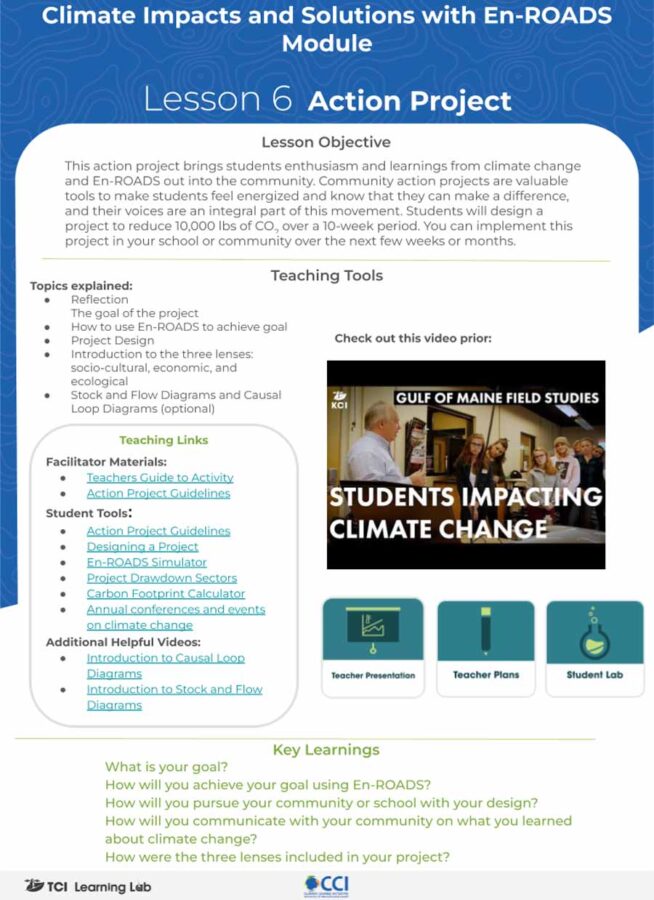

Climate Justice & Equity
We will all feel the effects of climate change, but we will not all feel those impacts equally. Increased natural disasters, food insecurity, lack of access to potable water, higher temperatures, and increased air pollution will considerably impact our most vulnerable populations. Understanding history and the systems in place that have created these inequities is imperative to understanding how climate change will exacerbate the injustices that underserved populations already face.
In this 6-week Learning Lab module, your students will:
- Increase their understanding of Climate Justice & Equity and build confidence in how to interpret scientific data
- Look at Climate Justice & Equity through TCI’s three lens approach: using the economic, sociocultural, and ecological lenses to understand all points of view
- Connect climate change to their local landscape
- Elevate their voices and start necessary conversations within the community as part of a hands-on action project.
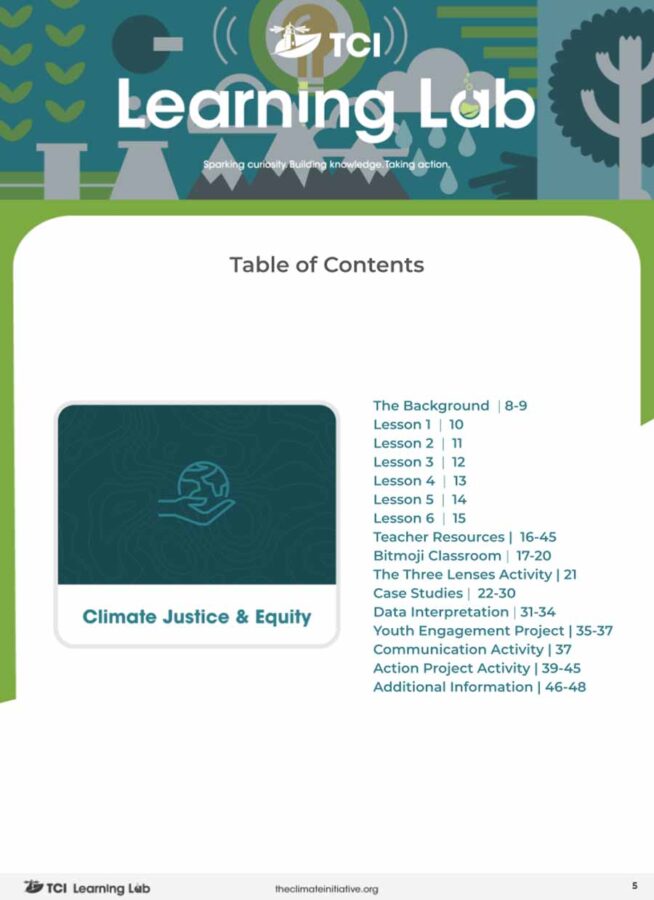
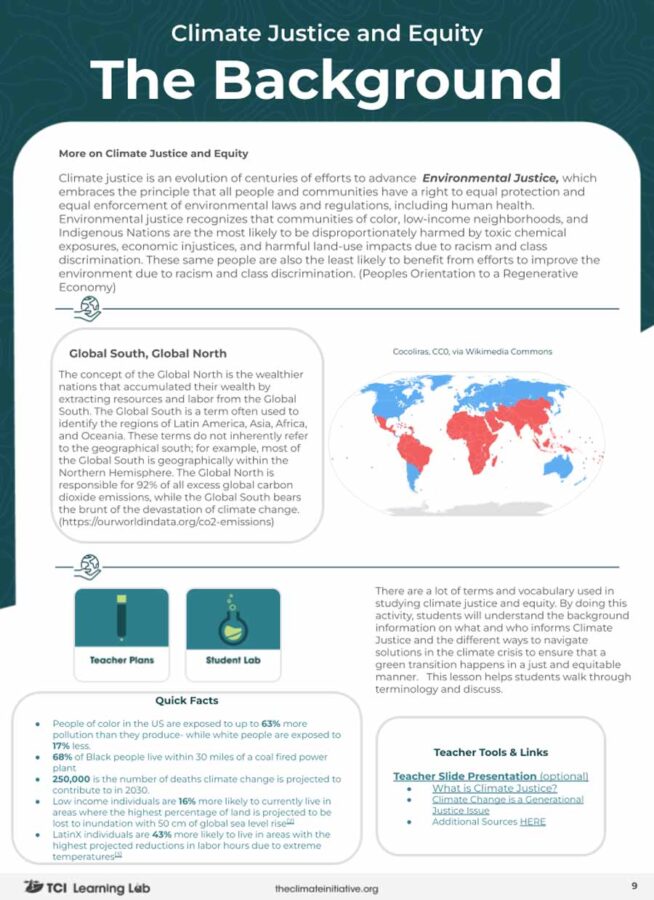
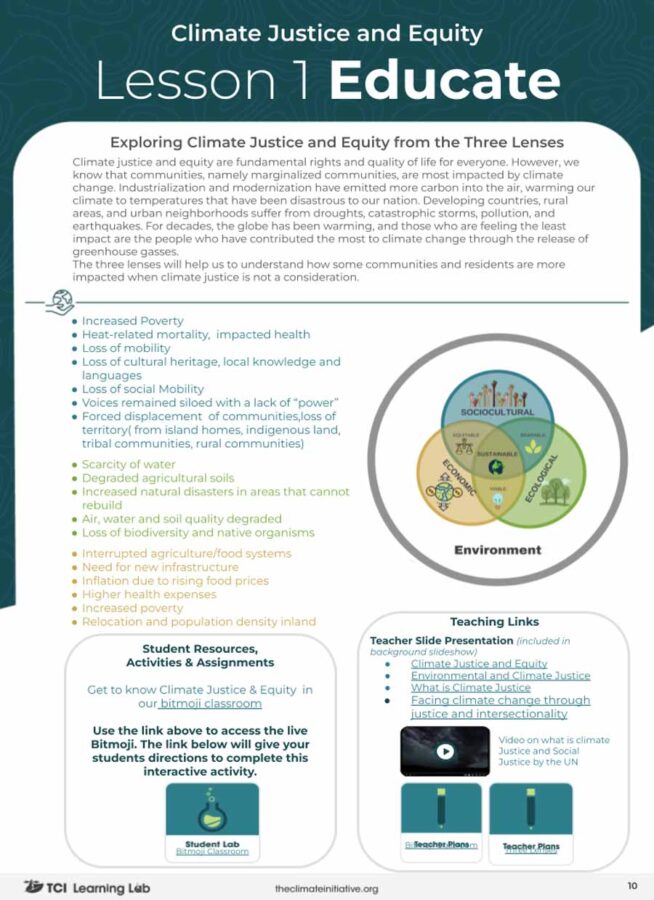
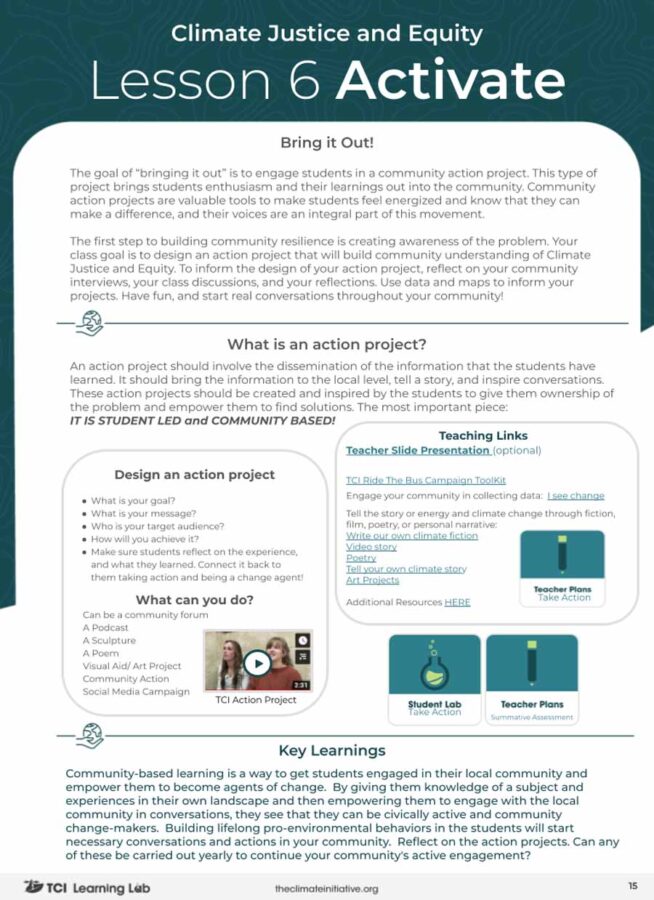

Invasive Species
An invasive species is any living organism, including bacteria and fungi, that is not originally from the area it is discovered in. However, this is also true for non-native species, the difference being that invasive species cause harm to local habitats and the ecosystem, while non-native species do not. Often lacking predators of any kind, they become opportunistic and can spread quickly. Invasive species cause harm to other organisms and the ecology of an area, but often cause problems in the economy of a town or state, and can be dangerous or bothersome to human health.
In this 6-week Learning Lab module, your students will:
- Increase their understanding of Invasive Species and build confidence in how to interpret scientific data
- Look at Invasive Species through TCI’s three lens approach: using the economic, sociocultural, and ecological lenses to understand all points of view
- Connect climate change to their local landscape
- Elevate their voices and start necessary conversations within the community as part of a hands-on action project.
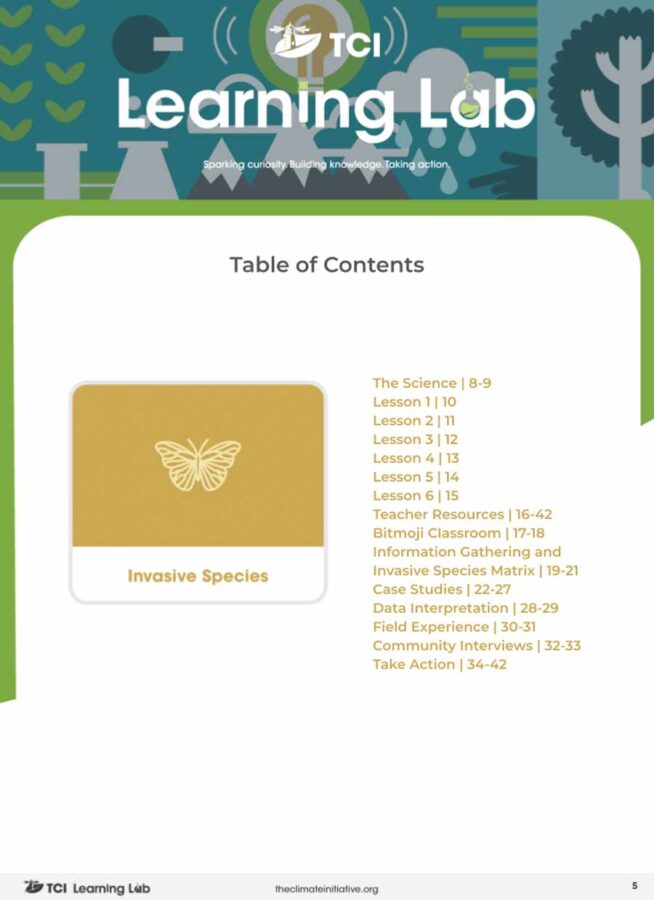
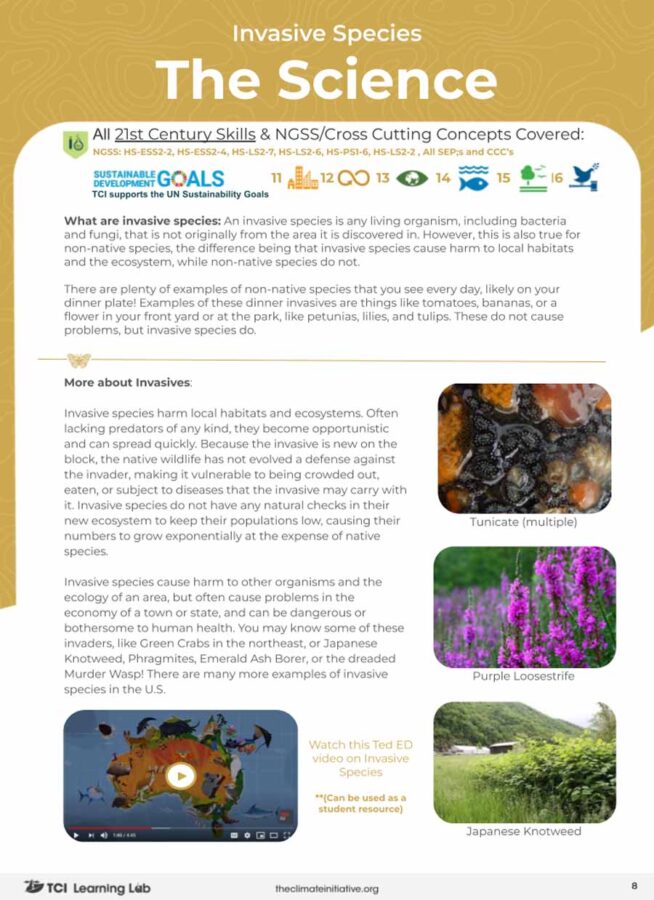
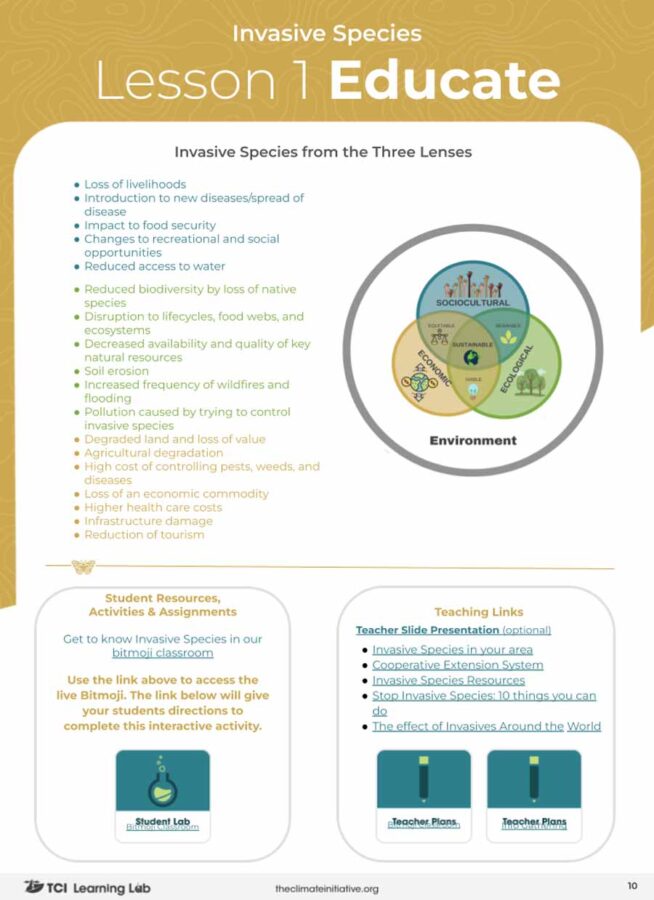
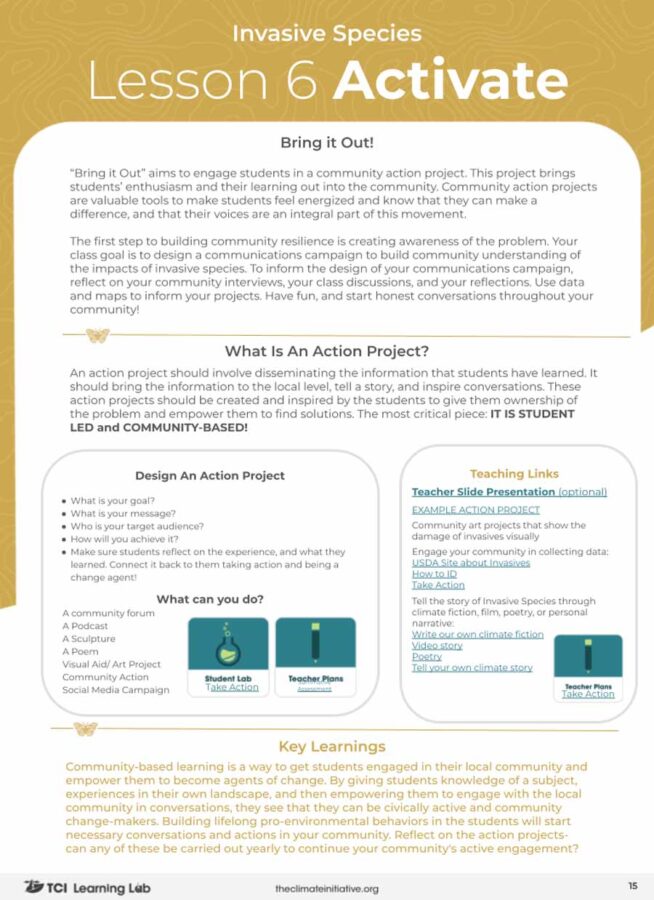

Floods & Droughts
Climate change drives both wet and dry extremes. Because of rising temperatures around the globe, evaporation increases. This increase in evaporation does two things: it dries out soils, lowering water levels in rivers and lakes, causing droughts, and, at the same time, the warmer air allows for water vapor to accumulate in a greater capacity. So while some areas of the world experience droughts and arid conditions that put them at risk for wildfires and crop failure, other parts of the world experience more significant amounts of rainfall which washes away soils and saturates the ground causing flooding
In this 6-week Learning Lab module, your students will:
- Increase their understanding of Floods & Droughts and build confidence in how to interpret scientific data
- Look at Floods & Droughts through TCI’s three lens approach: using the economic, sociocultural, and ecological lenses to understand all points of view
- Connect climate change to their local landscape
- Elevate their voices and start necessary conversations within the community as part of a hands-on action project.
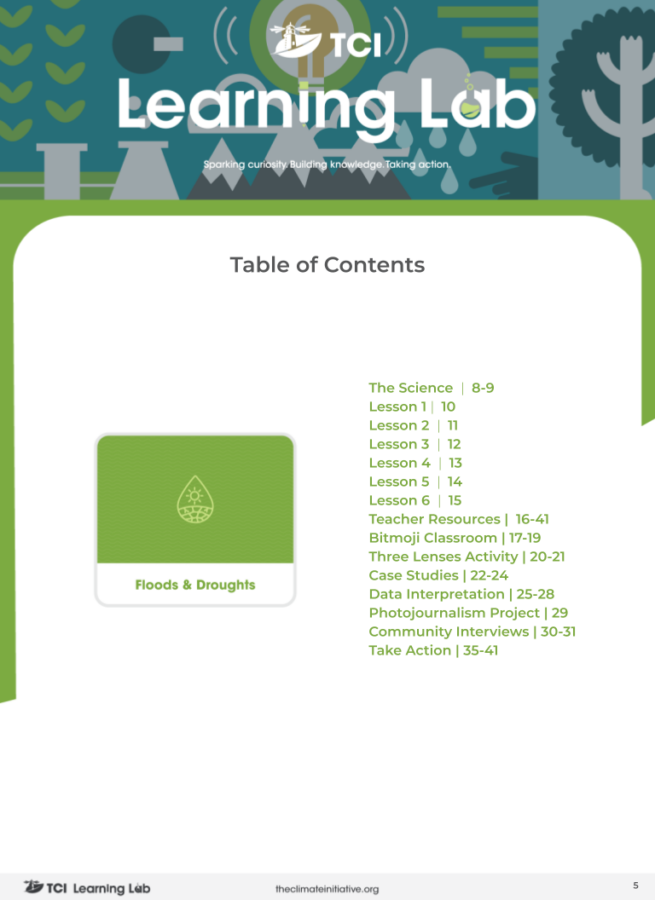
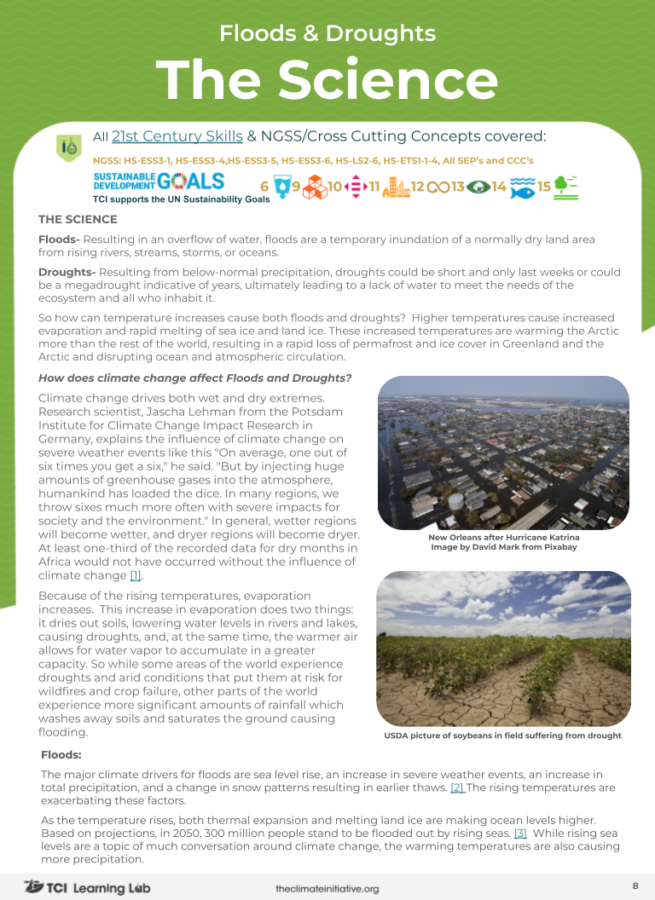
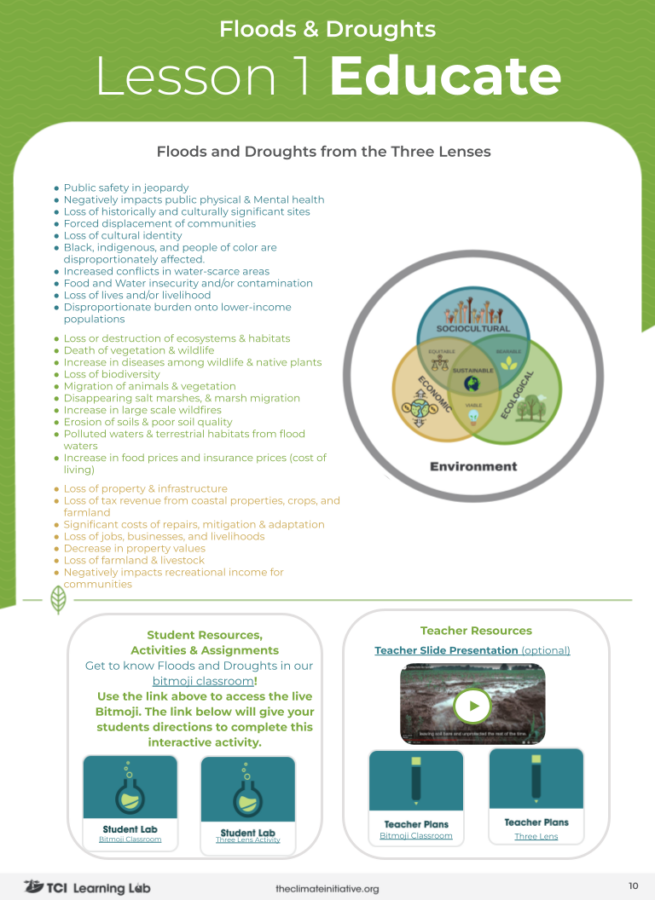
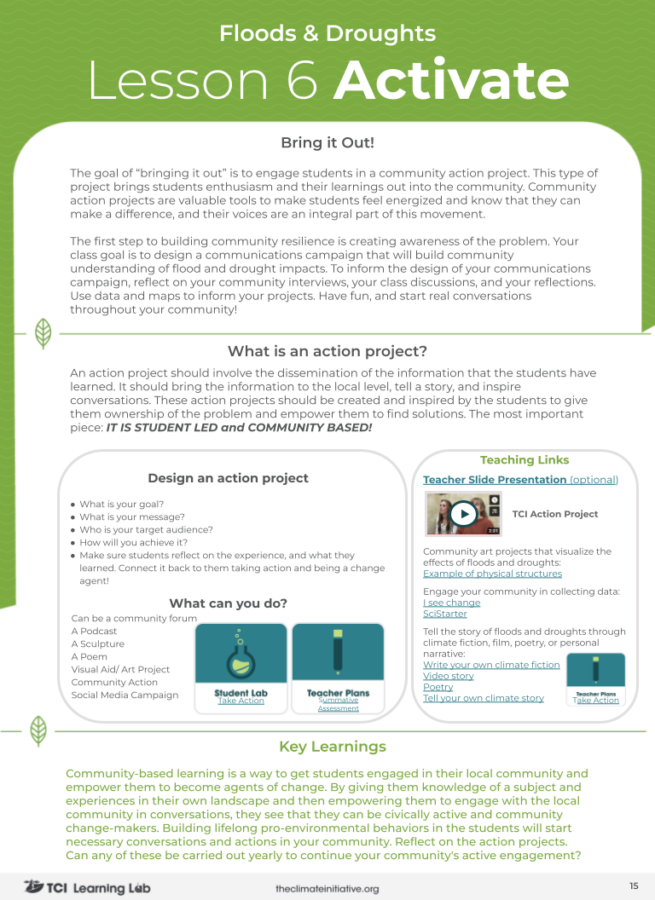

Sea Level Rise
Sea levels today are higher than they have been in the past 2,900 years. Since the industrial revolution, human activity has been releasing greenhouse gasses into the atmosphere by burning fossil fuels. The release of greenhouse gasses and the warming of our oceans is directly related to sea level rise (SLR).
In this 6-week Learning Lab module, your students will:
- Increase their understanding of SLR and build confidence in how to interpret scientific data
- Look at SLR through TCI’s three lens approach: using the economic, sociocultural, and ecological lenses to understand all points of view
- Connect climate change to their local landscape
- Elevate their voices and start necessary conversations within the community as part of a hands-on action project.
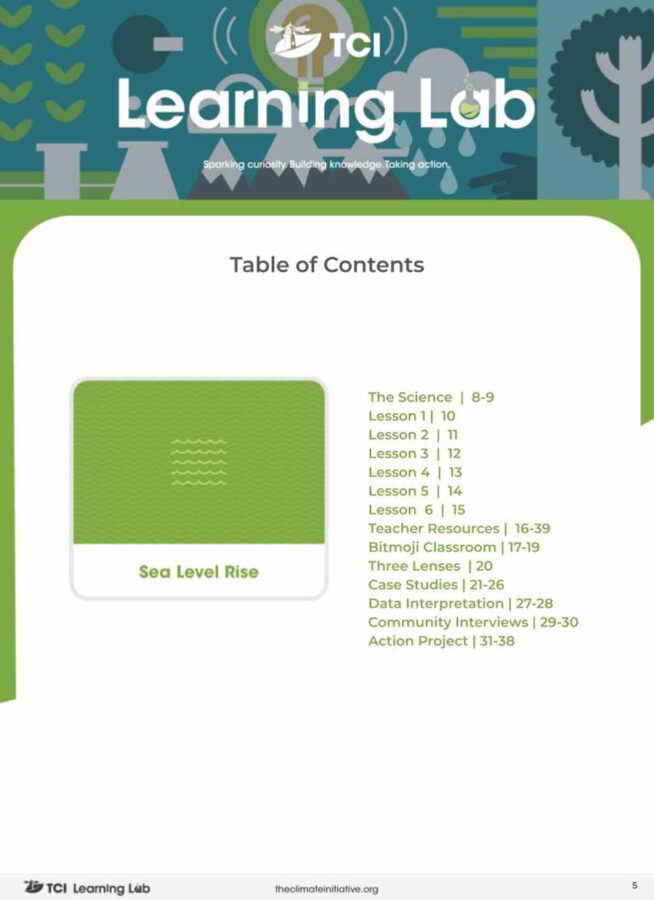
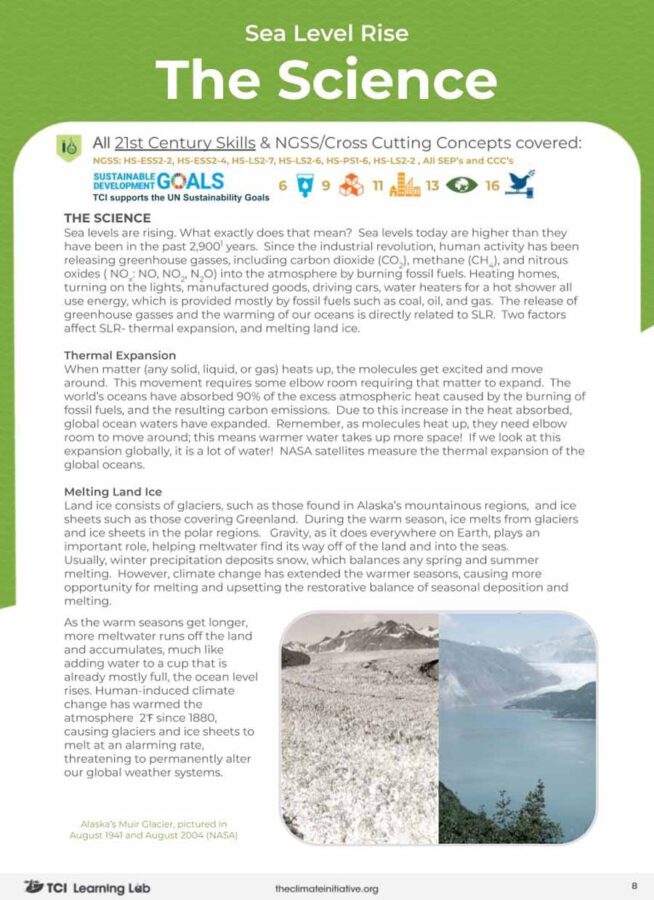
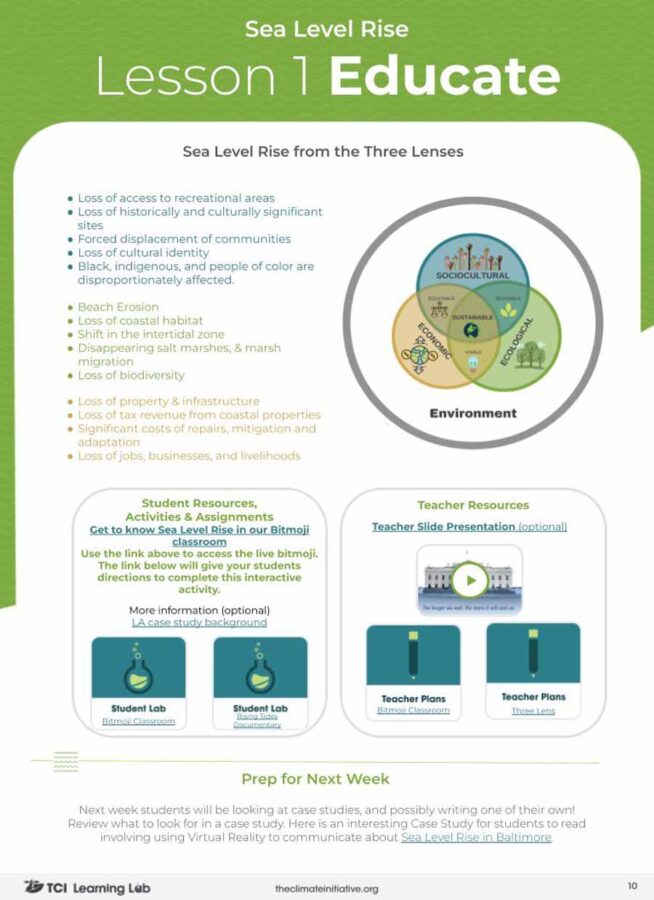
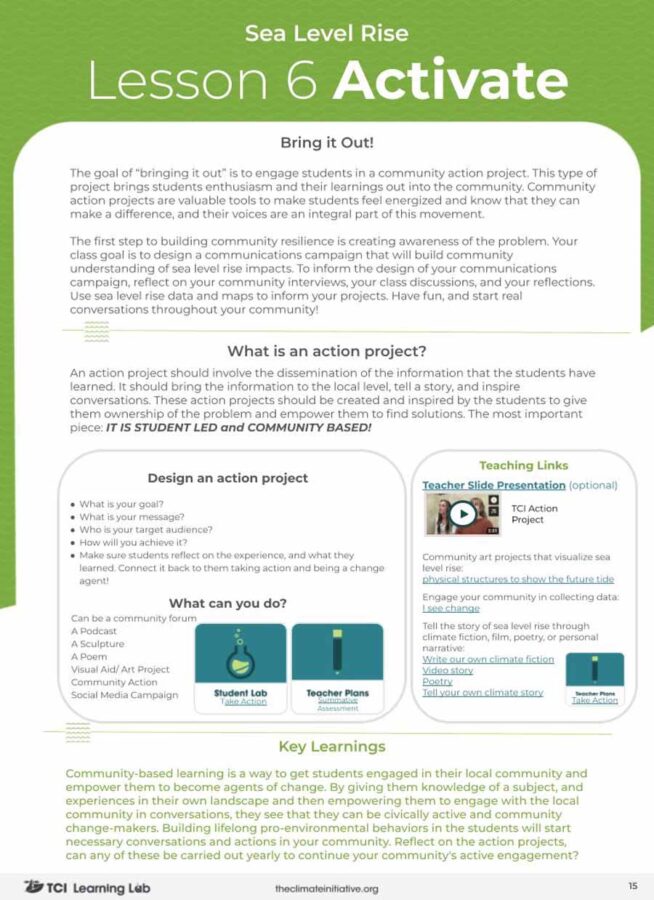

Renewable Energy
Energy use is one of the largest causes of climate change, and our dependence on fossil fuels is raising the temperature of our earth to the point of no return. Fossil fuels are a natural fuel such as oil, coal or gas, formed in the geological past from the remains of living organisms. It is no surprise then that fossil fuels are some of the largest contributors to greenhouse gas emissions and climate change. What you may not know is that fossil fuels are no longer the cheapest energy source. Renewables are actually becoming less expensive to install and use, and have the added bonus of not releasing greenhouse gasses into the atmosphere!
In this 6-week Learning Lab module, your students will:
- Increase their understanding of Renewable Energy and Fossil Fuels, and build confidence in how to interpret scientific data
- Look at Renewable Energy through TCI’s three lens approach: using the economic, sociocultural, and ecological lenses to understand all points of view
- Connect climate change to their local landscape
- Elevate their voices and start necessary conversations within the community as part of a hands-on action project.
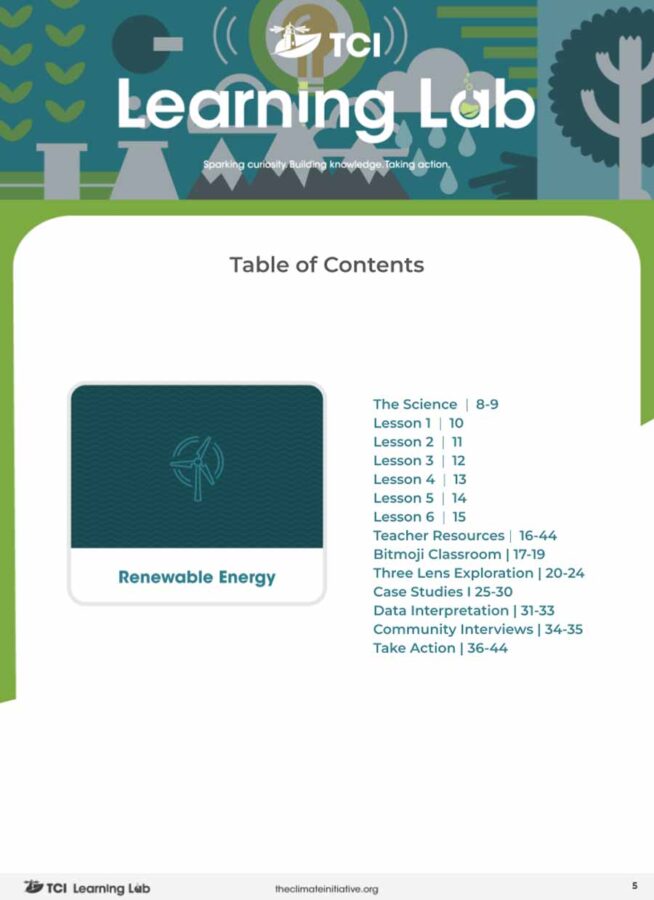
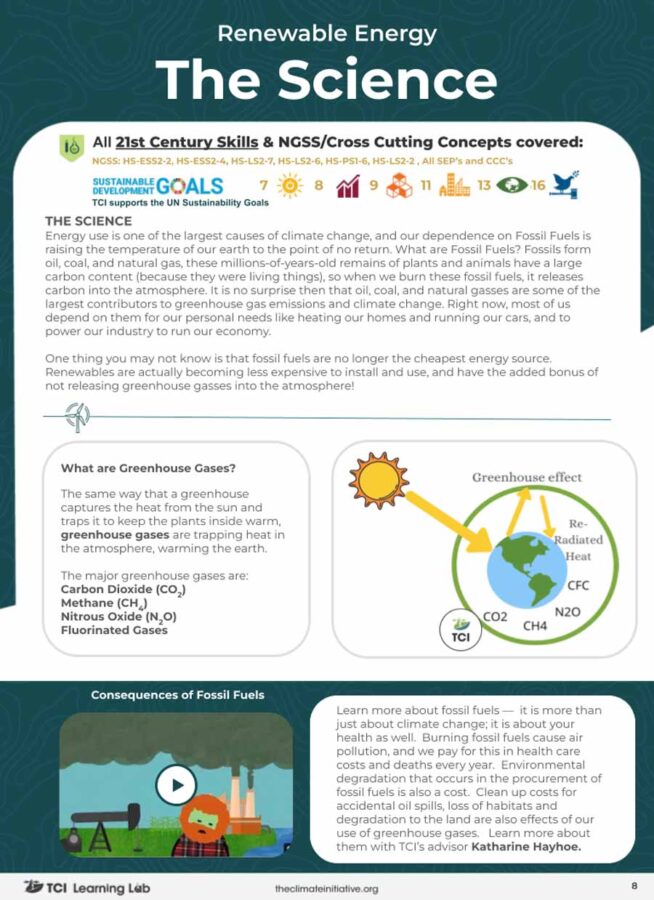
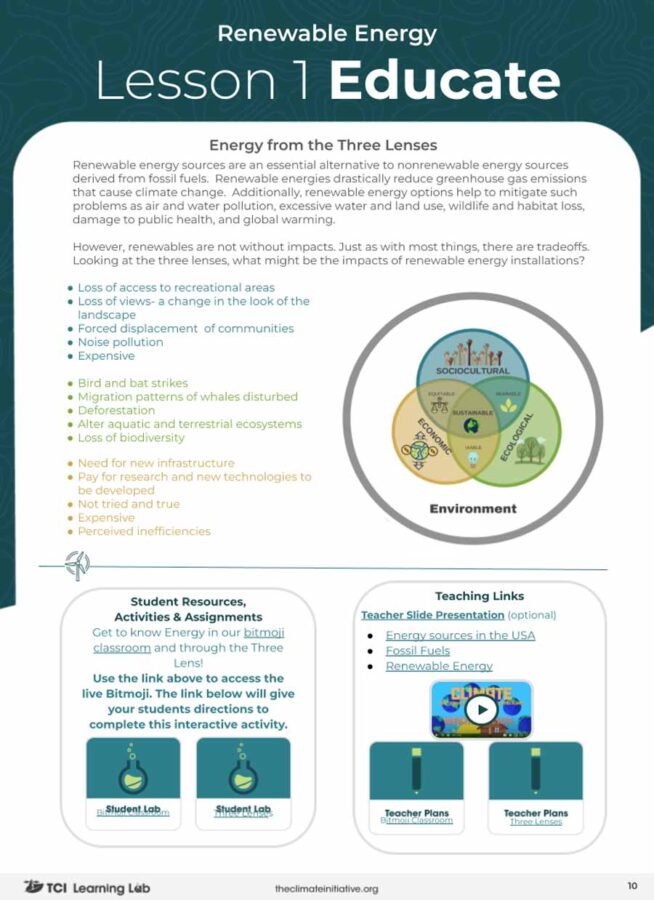
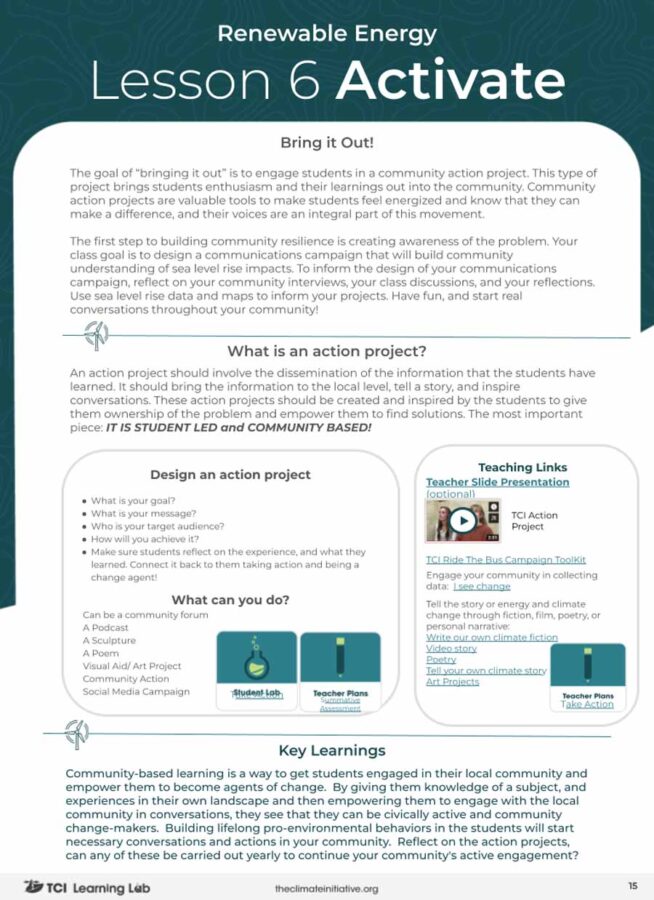

Agriculture & Climate Change
Agriculture is the world’s largest industry, producing most of the world’s foods and many of its fabrics. As well as being a large part of the economy in most countries worldwide, including the United States, agricultural products are an essential source of exchange, trade, and even political leverage. The greenhouse gasses with the largest contribution to rising temperature are carbon dioxide (CO2), methane (CH4), and nitrous oxide (N2O). Agriculture contributes around 10% to total greenhouse gas emissions.
In this 6-week Learning Lab module, your students will:
- Increase their understanding of Agriculture & Climate Change and build confidence in how to interpret scientific data
- Look at Agriculture through TCI’s three lens approach: using the economic, sociocultural, and ecological lenses to understand all points of view
- Connect climate change to their local landscape
- Elevate their voices and start necessary conversations within the community as part of a hands-on action project.
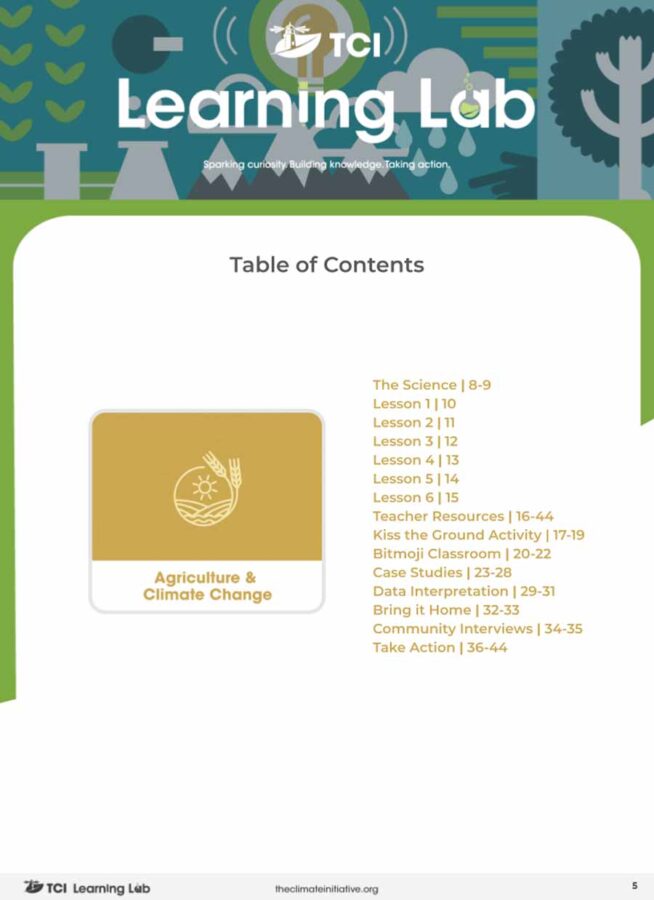
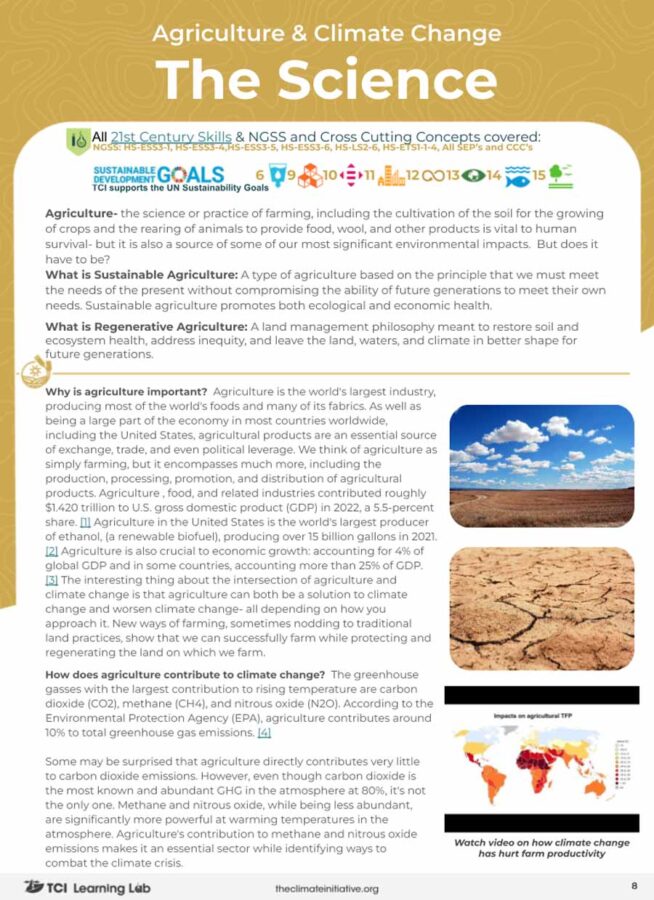
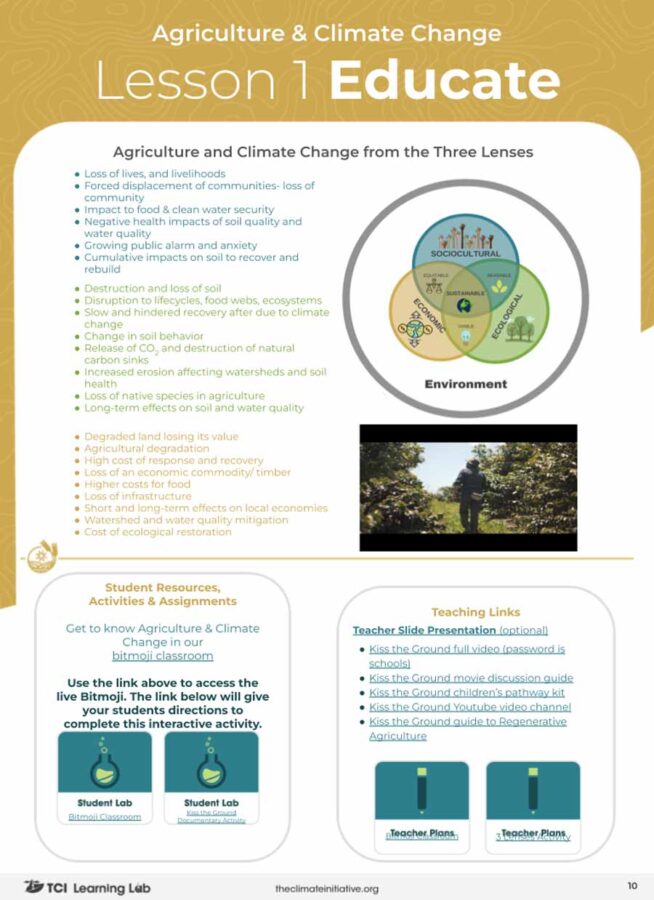
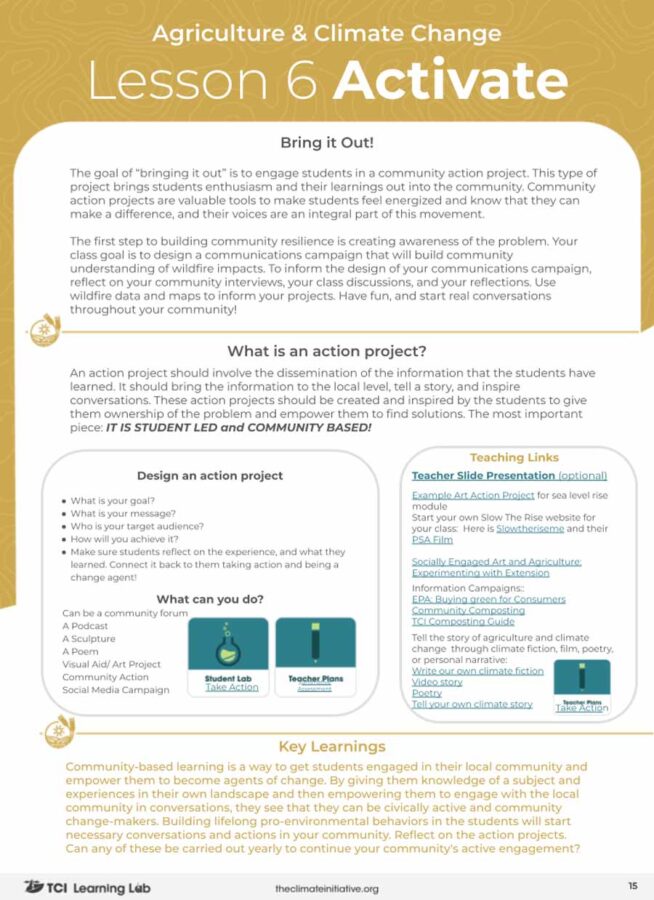

Civics Climate Action
Climate change is one of the leading regional, national, and global challenges facing communities worldwide. Exacerbated by industrial development policies, it is evident that climate change has long-term consequences on our economies, landscapes, and lives. We must implement policies and practices to mitigate damages to avoid a point of no return. All three branches of government can make policies that will affect climate action.
In this 6-week Learning Lab module, your students will:
- Increase their understanding of Civics & Climate Action and build confidence in how to interpret scientific data
- Look at Climate Policy through TCI’s three lens approach: using the economic, sociocultural, and ecological lenses to understand all points of view
- Connect climate change to their local landscape
- Elevate their voices and start necessary conversations within the community as part of a hands-on action project.
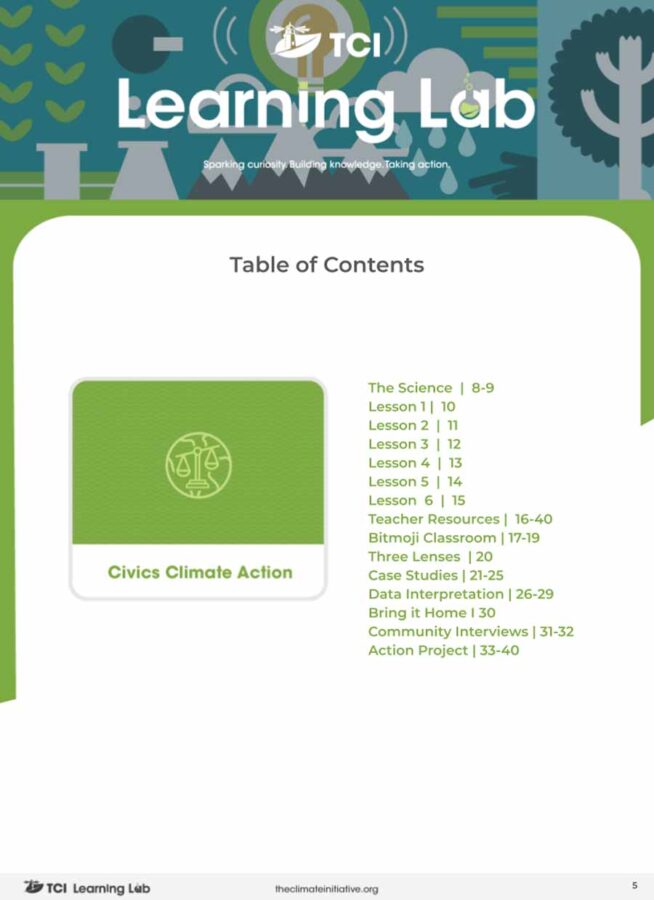
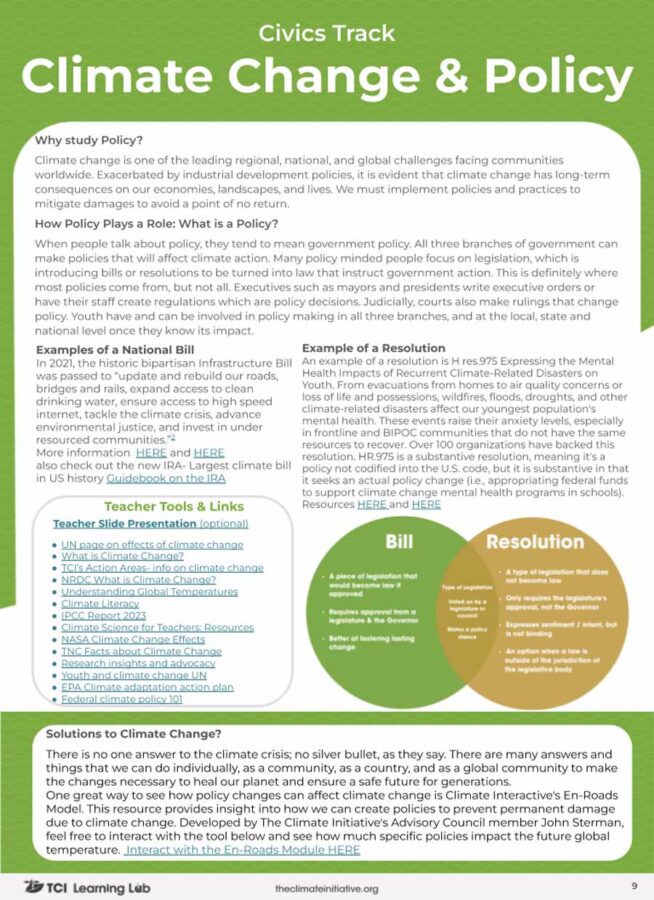
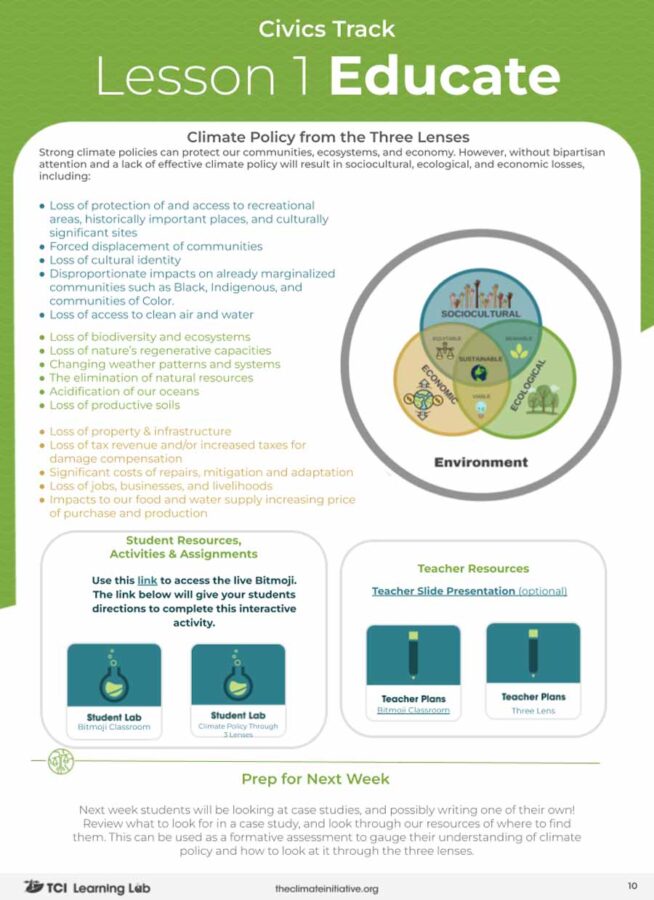
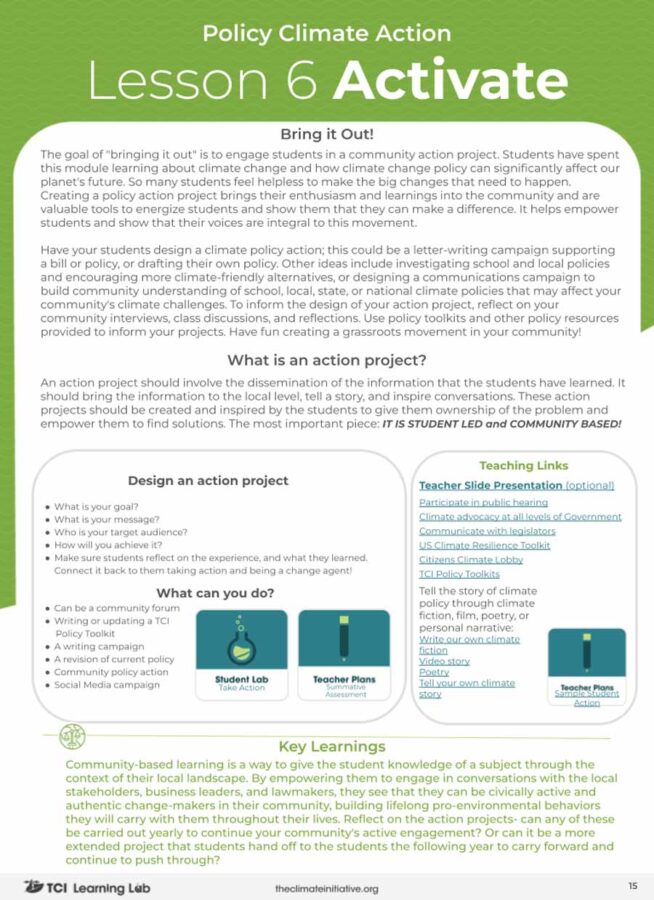
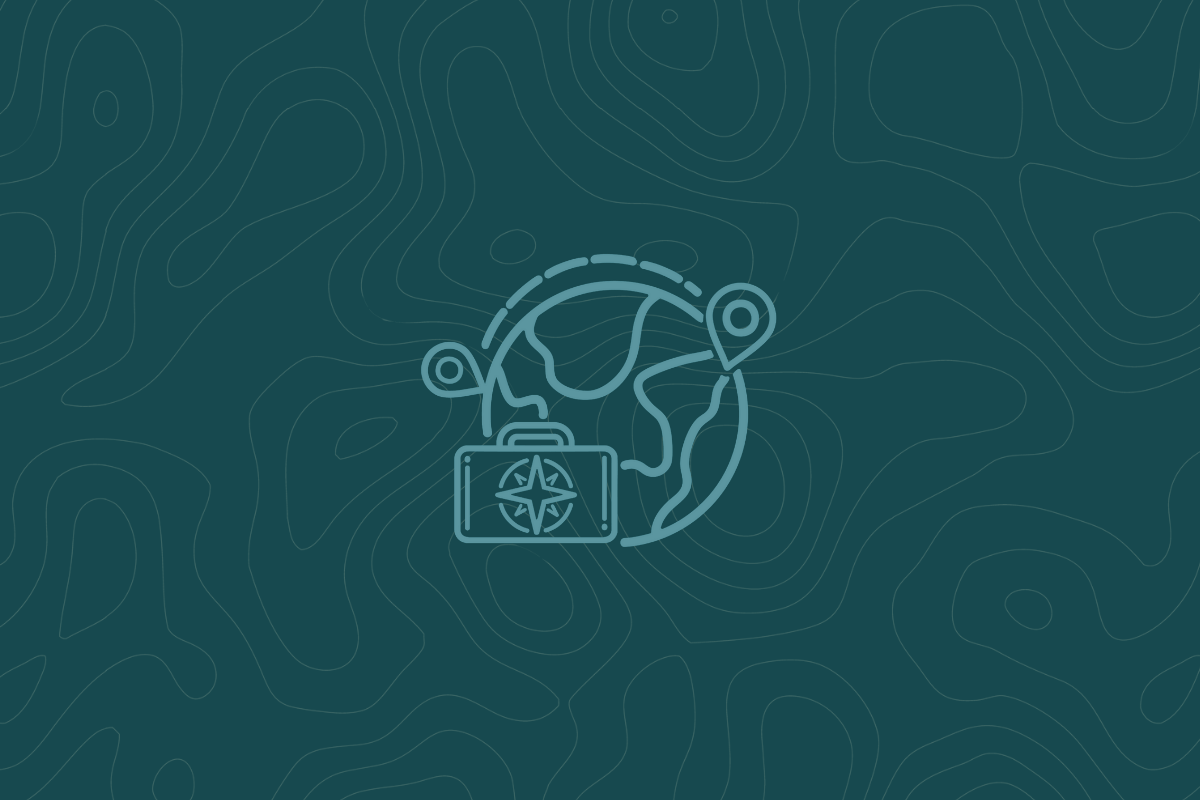
Climate Migration
Climate Migration refers to the movement of people due to changes in climate and environmental conditions. This can include rising sea levels, extreme weather events (such as hurricanes, droughts, or wildfires), desertification, and other changes in climate patterns that make certain areas uninhabitable or less suitable for agriculture and living.
In this 6-week Learning Lab module, your students will:
- Increase their understanding of Climate Migration and build confidence in how to interpret scientific data
- Look at Climate Migration through TCI’s three lens approach: using the economic, sociocultural, and ecological lenses to understand all points of view
- Connect climate change to their local landscape
- Elevate their voices and start necessary conversations within the community as part of a hands-on action project.
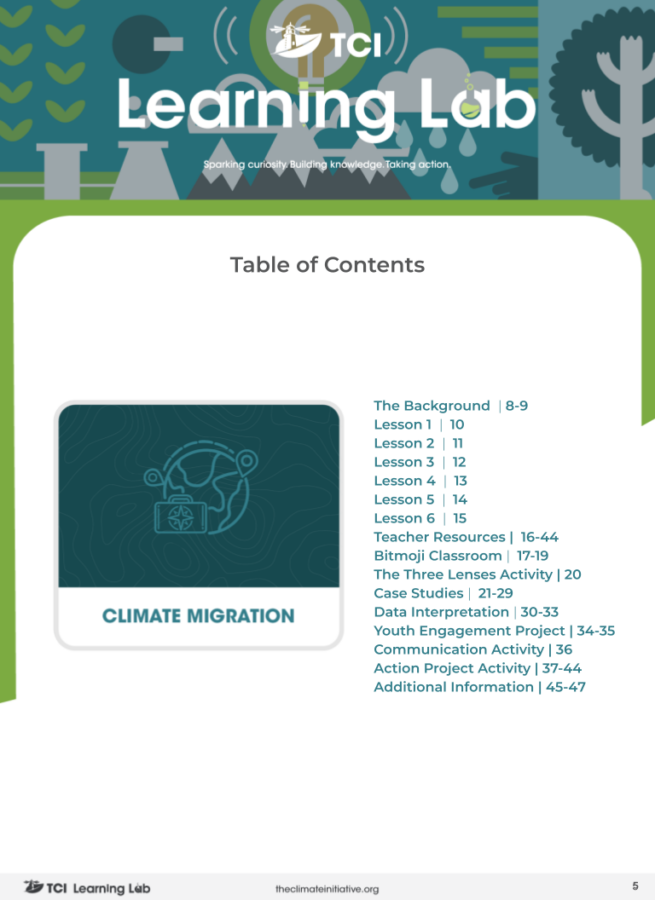
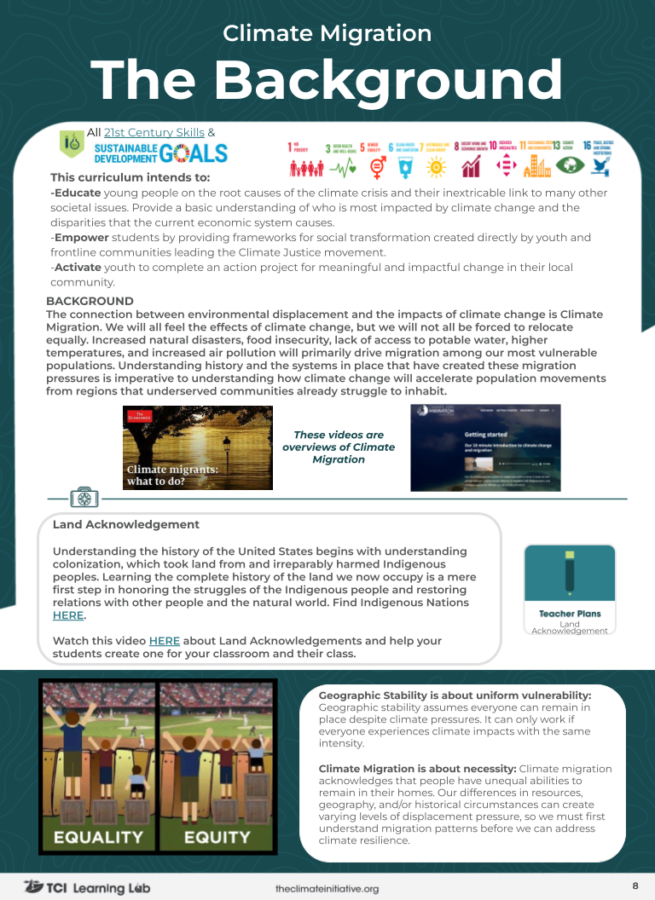
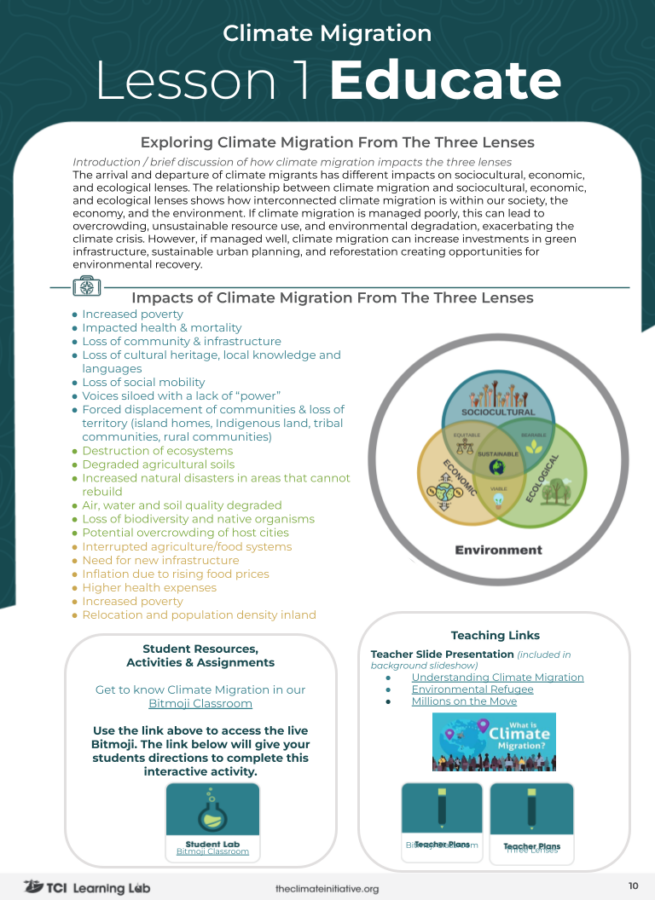
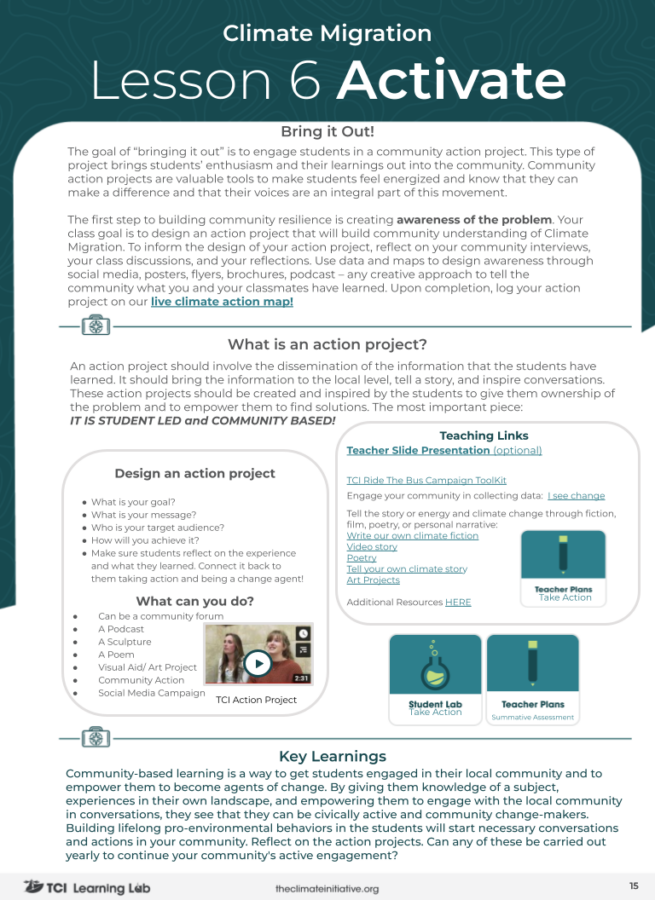
All Modules
Align to the UN Sustainable Development Goals
Adhere to NGSS Crosscutting Concepts
Comply with 21st Century Skills Standards
Are Translated into 5 Additional Languages
How It Works
1.
Sign-up below to receive our Learning Lab self-paced educator training modules
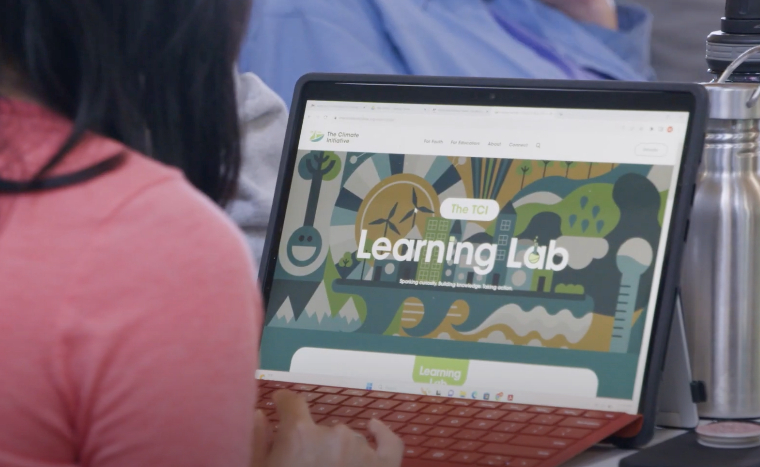
2.
At conclusion of training modules, receive access to ALL 9 Learning Lab modules
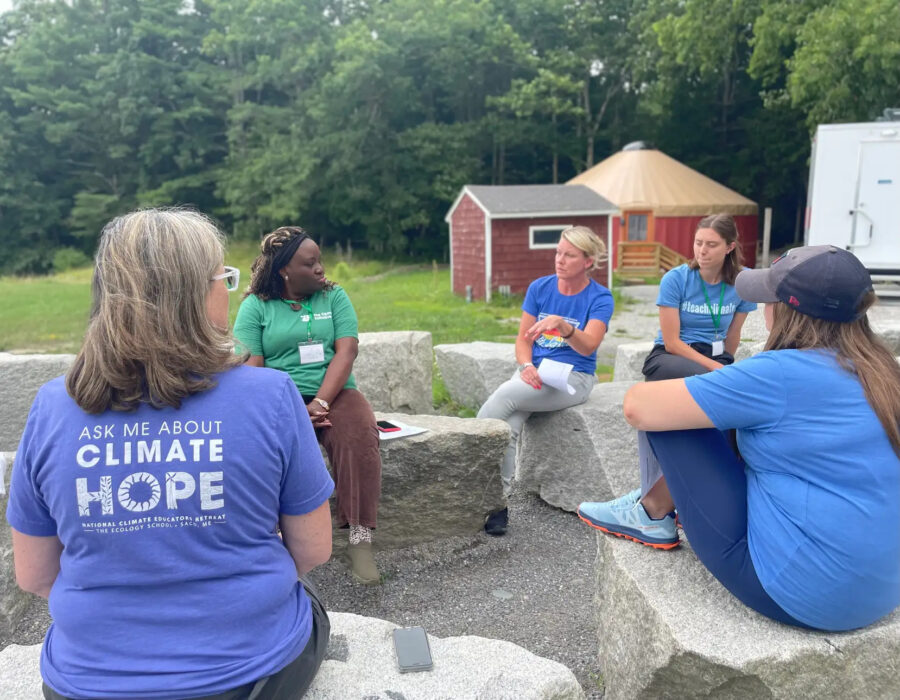
3.
Choose which Learning Lab module you will implement first!
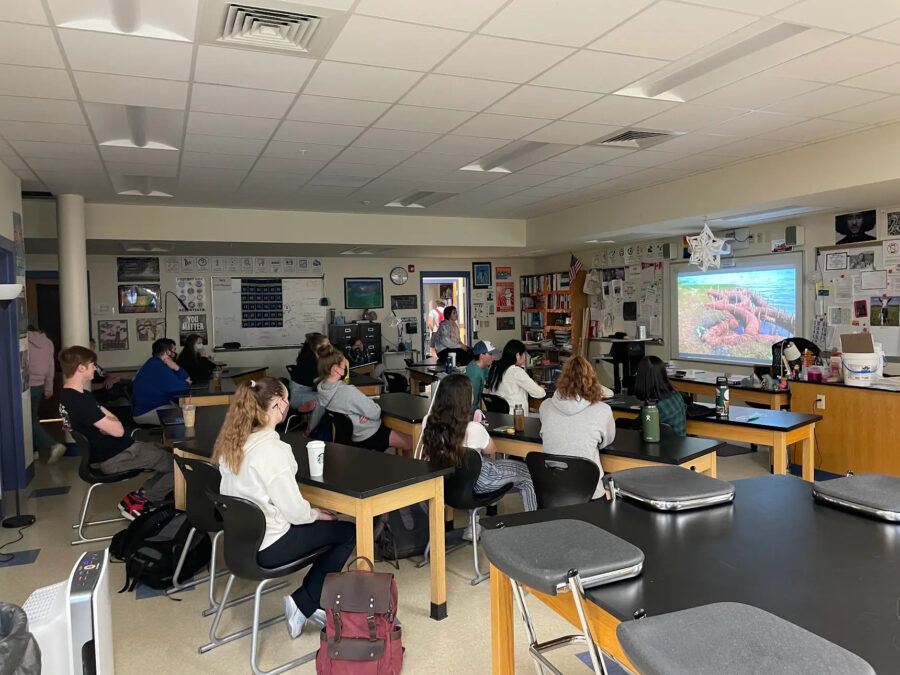
How It Works
-
1.
Sign-up below to receive our Learning Lab self-paced educator training modules
-
2.
At conclusion of training modules, receive access to ALL 9 Learning Lab modules
-
3.
Choose which Learning Lab module you will implement first!



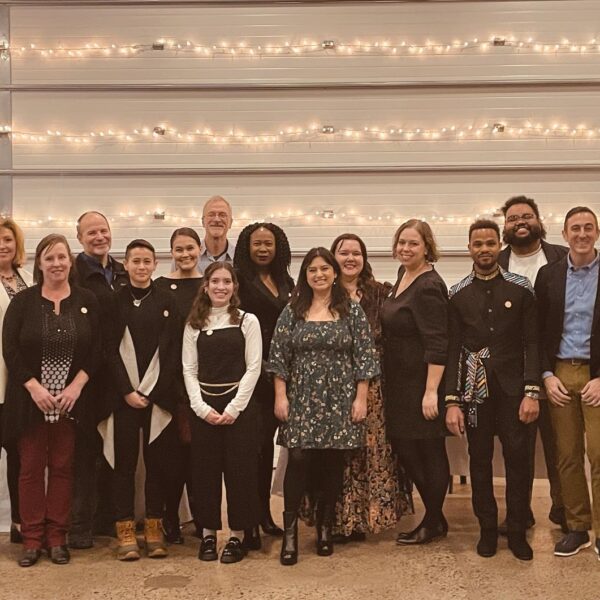
Meet The Climate Initiative
TCI is a non-partisan, solutions-based organization providing resources for local, tangible solutions to a global challenge.
We believe youth are the key to solving the climate challenge because they influence and foster climate concern among their parents, communities and decision-makers. Our goal is to develop a cohesive youth voice that influences local stakeholders to embrace climate solutions. TCI aims to educate, empower and activate 1 million youth to reach this goal by 2025.




